- Cover Letter Tips

Executive Cover Letter Examples and Tips for 2024

10 min read

Looking for your next executive role? Cover letters are a necessary evil of the job search process. No one really likes to write them. That’s mainly because most people don't know what to include to make the cover letter worth reading. Before you get started on your executive cover letter, chances are you will have a few burning questions in mind.
Should you restate your resume?
Should you tell your whole story?
What exactly are hiring managers looking for?
Let us put your mind at rest. Cover letters should be your introduction to the employer. It's your chance to say hello and explain why you would be an asset to the company. As an executive, it's even more important to perfect this part of the process. Your role will be monumental, so your first impression has to be on point.
An executive cover letter should be written in a compelling and professional manner. Be sure to mention your key skills in leadership, people management, and business growth. You can do this by highlighting aspects of your resume or briefly showcasing your story. You may choose to Include a short list of your strongest skills to demonstrate your leadership.
If you’re ready to get writing, you’ve come to the right place. A quick way to ensure you can efficiently write cover letters is to have a base template. In the following guide, we will detail everything that you need to know about writing an executive cover letter. Once you’ve read our 10 key tips, you will have no problem creating an application that wins you the interview.
What should an executive cover letter include?
First things first, you need to know what your executive cover letter should include. You have roughly 300-400 words to play with here. However, no hiring manager wants to read a long, meandering letter about your life up until this point. Save that for your memoir. Instead, you need to ensure that your cover letter has a solid structure, as follows:
Cover letter header
Introduction/hook
Main paragraphs
Conclusion
Sticking to this format will help your cover letter “flow” well. The hiring manager can quickly gain the information that they need by skimming the document. Much like a story, your cover letter should have a natural narrative. It starts with the beginning, moves seamlessly onto the middle (i.e. the main point), and concludes with a strong ending. If you manage to get that right, you will captivate the hiring manager with your professional history.
Effective executive cover letter example
Before we go anything further, let’s start with some inspiration. Below is an executive cover letter example that ticks all of the boxes. Check it out now:

Why this example excels
There’s a reason that this executive cover letter works so well. The letter includes everything that you would expect from a high-level professional. Here are five things that you may have noticed right from the offset:
It includes a professional letter format
The heading matches the resume
It’s short and sweet — one page with three basic paragraphs
It includes a professional greeting
The content is tailored and to the point
As a rule, the body of the letter should be no more than three short paragraphs explaining which job you want, why you want it, and why you are qualified to have it. You should support your claims with accomplishments and refer to your resume.
If you're starting from scratch, read our related post: Here is What a Good Cover Letter Looks Like . The guide gives you a good overview of how you can get started with your application letter. When you’ve read that, come back here and we will take things to the next level.
You know the drill. Hiring managers will expect more of you as you climb the career ladder. As an executive, your cover letter needs to be a cut above the rest. You have to showcase your strongest leadership skills while meeting all of the above requirements. If you create a basic template, you can quickly customize the document with the nine tips below.
9 Ways to Make Your Cover Letter Stand Out
Let’s say that you already have the basic structure down. What happens next? The answer is that you level-up your document. Starting at the top of your cover letter, here are nine tips from the executive resume writer team at ZipJob to get your cover letter noticed.
1. Indicate why you're writing
You may be writing to express interest in an unadvertised opportunity, but you're most likely writing in response to an open position. In the first paragraph, you should tell the reader exactly which job you are applying for and where you found out about the opening. Many HR offices track adverts and referrals, so it’s important to highlight these details.
But that’s not the part that will grab the reader’s attention. You need a hook. For example, you could list your credentials in the first paragraph to show why you would be an intuitive fit for the company. On the other hand, if you were referred by a person in the company, you can use this point as your hook. Figure out what information will make you stand out here.
An example:
I heard about (the job) from your (Title), (Name), and am eager to apply for the position. My credentials include….
2. Tell your story in a compelling manner
Language matters when it comes to your executive cover letter. Include your unique value explicitly, yet concisely. That is quite a challenge, but your hard work will pay off. You may use a variation of your elevator pitch, for instance, or a brief summary of why your work experience and qualifications is a perfect fit for the job in question.
To add some color to your cover letter, pick your words wisely. Use compelling verbs and avoid words such as "prepared" and "managed." Those words are passive, dull, and overused: your cover letter should be interesting and tell a compelling story.
3. Focus on up to four important facts
While your resume should be detailed, cover letters should be brief with only the most intriguing information and the highlights of your leadership story so far. To get that right, you can either showcase your accomplishments in a few paragraphs or bullet form.
Be selective about the accomplishments you include in your cover letter. Felicia Tatum, executive resume writer and CEO of Creative Career Solutions , recommends including “no more than four accomplishments” in your cover letter. “The resume can show the details, let the cover letter show the facts so it entices the reader to look at the resume,” she explains.
4. Showcase your leadership abilities in three lines or less
Using language such as "oversaw," "directed," "executed," "delivered," and "owned" will make your cover letter stronger. Including two to three sentences about your abilities to lead others, lead departments, or lead a company will showcase you as a strong executive.
The first sentence should have your strongest information and senior leadership skills, followed by one or two sentences to strengthen and prove the claims from the first.
Bullet points are a great way to draw the eye to your best accomplishments. This is only effective when used sparingly, though. Limit the number of bullet points and the number of lines they take up in your cover letter.
5. Provide value through your accomplishments
As we have already mentioned, listing accomplishments is a quick way to highlight your strengths. However, it’s vital that you also provide evidence to back up any claims that you make. You can do this by including numbers, such as costs saved or costs slashed, or mentioning awards, achievements, or projects you completed.
The more specific you are in your cover letter, the better your chances of success. Show the hiring manager that you’re more than just talk . Providing specific evidence of how you have performed in the past could make all the difference to your application.
Remember to use the same style as your resume so they look like a cohesive application. Use the same resume font , bullet point style, and numbers. That will leave a great impression on your reader, even when you reword the data to make a more persuasive narrative.
Related read: Using the STAR Method to Create a Superior Resume (+ Examples)
6. Address the reader directly (if you know the name)
“Remember that a person’s name is to that person the sweetest and most important sound in any language.”— Dale Carnegie
The more personalized the cover letter, the better it will be received. So, if you know the hiring manager’s name — through online research or even LinkedIn— you should include it now. Addressing them directly is likely to win you some points. Of course, there are times when you won’t know their name and need to use a standardized greeting instead.
Before you start writing your cover letter, do some research. Take a look at the company’s website and LinkedIn page, for example. This is a great way to know the key players and be more prepared to write a customized application. It can also give you clues to the company's goals, visions, current projects, recent media attention, and current leadership team.
7. Include a call to action
At the end of your letter, include a call to action. This is the action you’d like the employer to take after reading your letter. Here are some examples of final lines you may use:
“Please contact me at your earliest convenience.”
“I look forward to speaking to you and encourage you to reach out with any questions.”
“Please let me know when you’d like to discuss my resume further.”
Remember, the call to action should always be in the very last sentences before you close out the letter. Make it conversational, but never pushy. It is the hiring manager's job to review applications and contact the best candidates, so be polite without sounding desperate.
8. Add your signature
It goes without saying that you should include your name to the end of the letter. However, add that personalized, executive touch, paste in your actual signature. It takes minimal effort but can go a long way. The visual impact of your signature carries more weight than you might imagine and will help you to make a lasting impression on the hiring manager.
There are a couple of ways to achieve this look. First up, you can take a picture of your actual signature, scan it to your computer, and upload it to your word processor. Some software, such as Adobe Acrobat, will also allow you to draw your signature directly into the program.
9. Take the time to edit first
When you’ve done all of the above, you might think you’re ready to hit “send” on your executive cover letter. However, before you do that, there’s one last thing that you should take care of. It’s crucial that you edit your document before you submit it.
There are two reasons for this. First of all, you need to ensure that no sneaky typos or spelling mistakes have gotten through the net. These errors will put the hiring manager off fast. Secondly, this edit will give you the chance to cut out any content that doesn’t add value to your application. Read through each part of your cover letter and make sure that each element of it will help push your application over the line.
In conclusion, your executive cover letter should be a short highlight reel that engages the reader. Personalizing your cover letter with your most impressive accomplishments will make it stand out. However, you need to make sure those accomplishments are related to leadership, motivation, and business development. That savvy move will position you as an executive with plenty to offer.
If you follow the above guidelines, you can write a killer executive cover letter in no time and increase your opportunities for interviews.
Recommended reading:
Please Find Attached My Resume: How to Use This Phrase
How to List an MBA on a Resume (+ Examples)
7 Tips for Writing A Cold Email for a Job (+ Examples)
Charlotte Grainger, Editor & Content Writer, Charlotte Grainger, Editor & Content Writer
Charlotte Grainger is a freelance writer living and working in Sheffield, UK. She has a passion for career development and loves sharing tips and advice. Follow her on Twitter

Our resume services get results.
We’ve helped change over 30,000 careers.
Get a free resume review today
Our experts will review your resume’s grammar, layout, and ability to pass ATS — all free and delivered straight to your inbox.
PROTECT YOUR DATA
This site uses cookies and related technologies for site operation, and analytics as described in our Privacy Policy. You may choose to consent to our use of these technologies, reject non-essential technologies, or further manage your preferences.
18 Professional Executive Cover Letter Examples for 2024
Your executive cover letter must reflect your commanding leadership and strategic vision. Showcase concrete examples where your leadership directly contributed to your previous company's success. Demonstrate in your letter how your innovative thinking has solved complex problems. Ensure you highlight your ability to inspire teams and drive them towards achieving corporate goals.
All cover letter examples in this guide
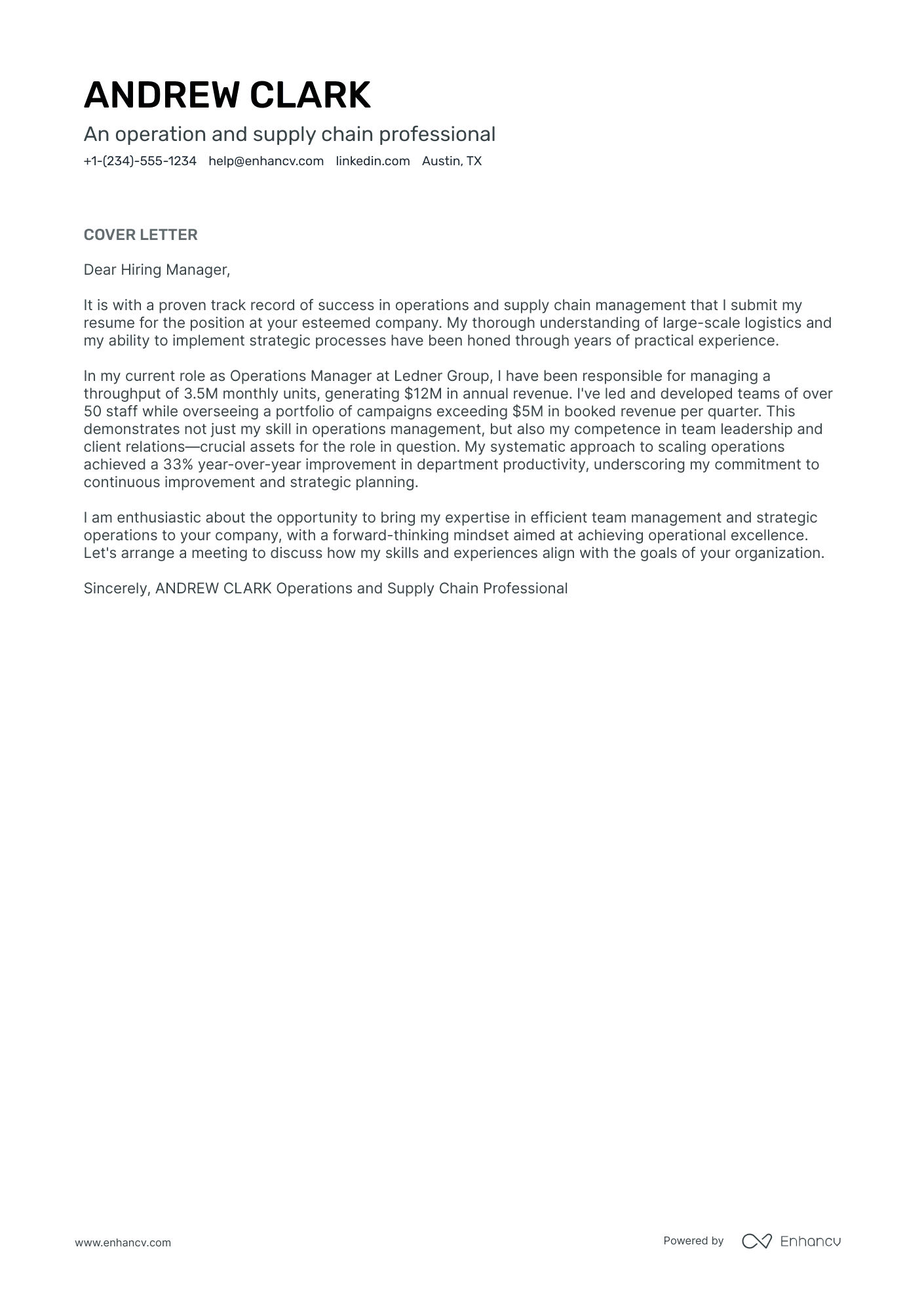
Alliance Manager
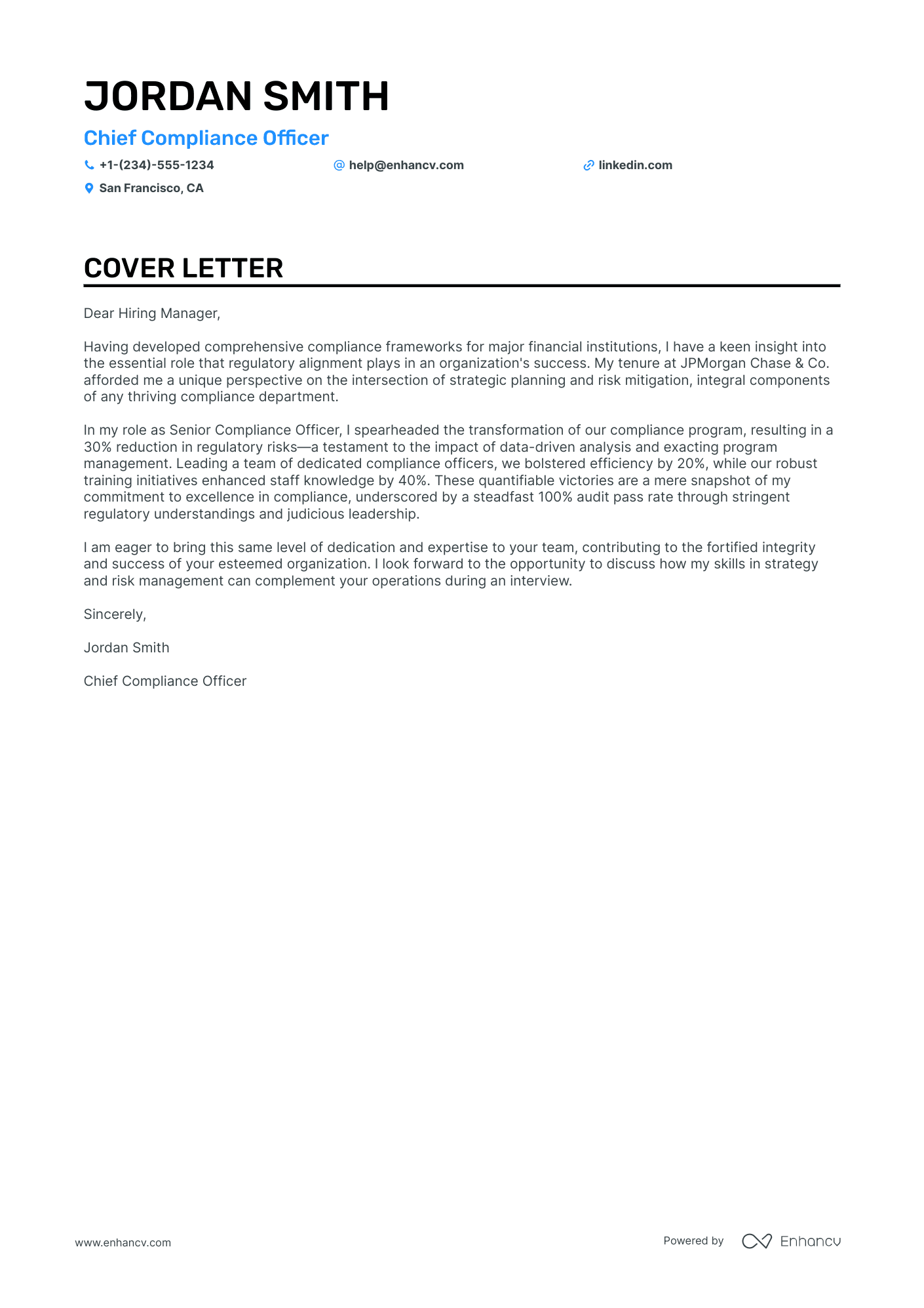
Chief Executive Officer
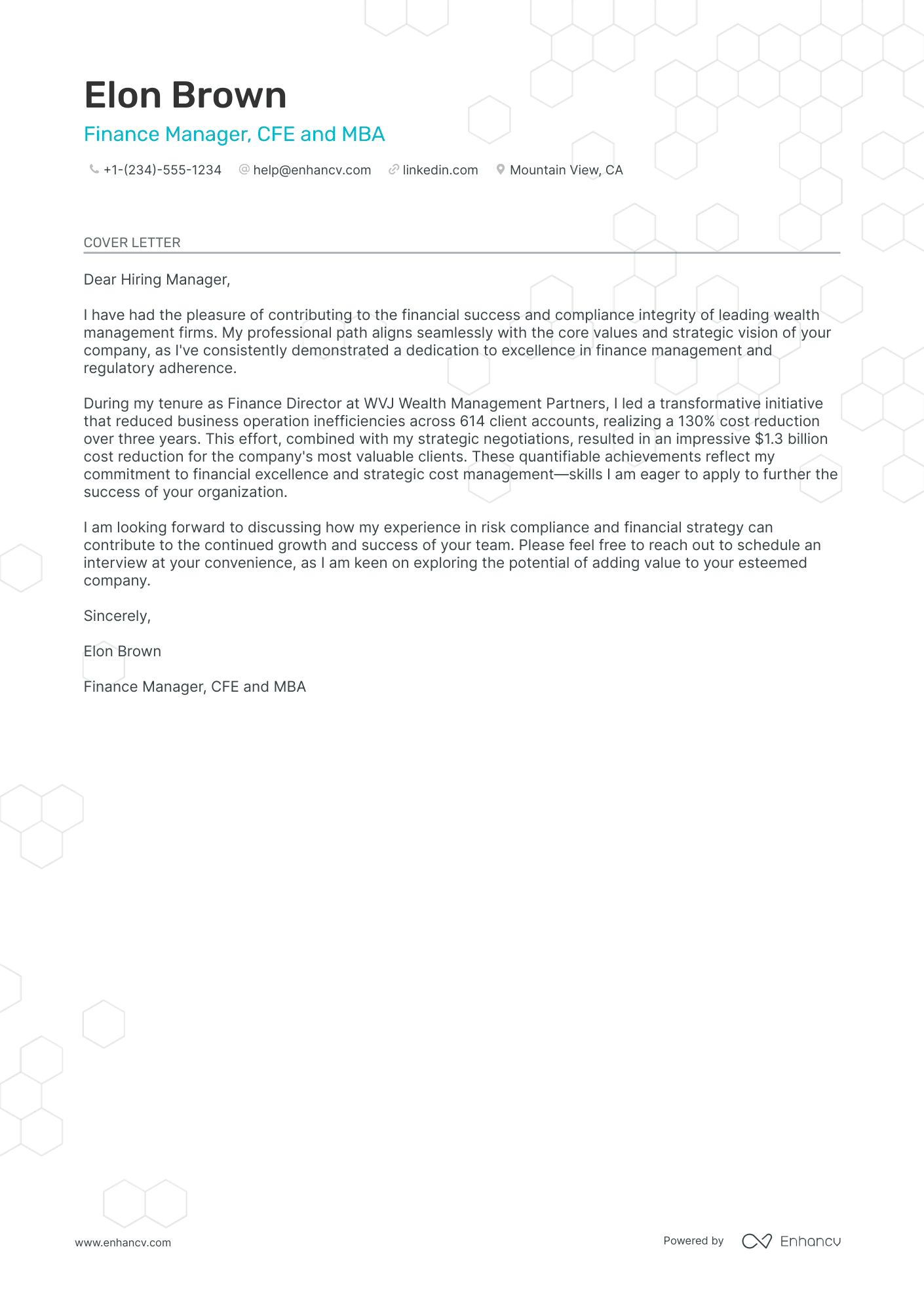
Chief Financial Officer
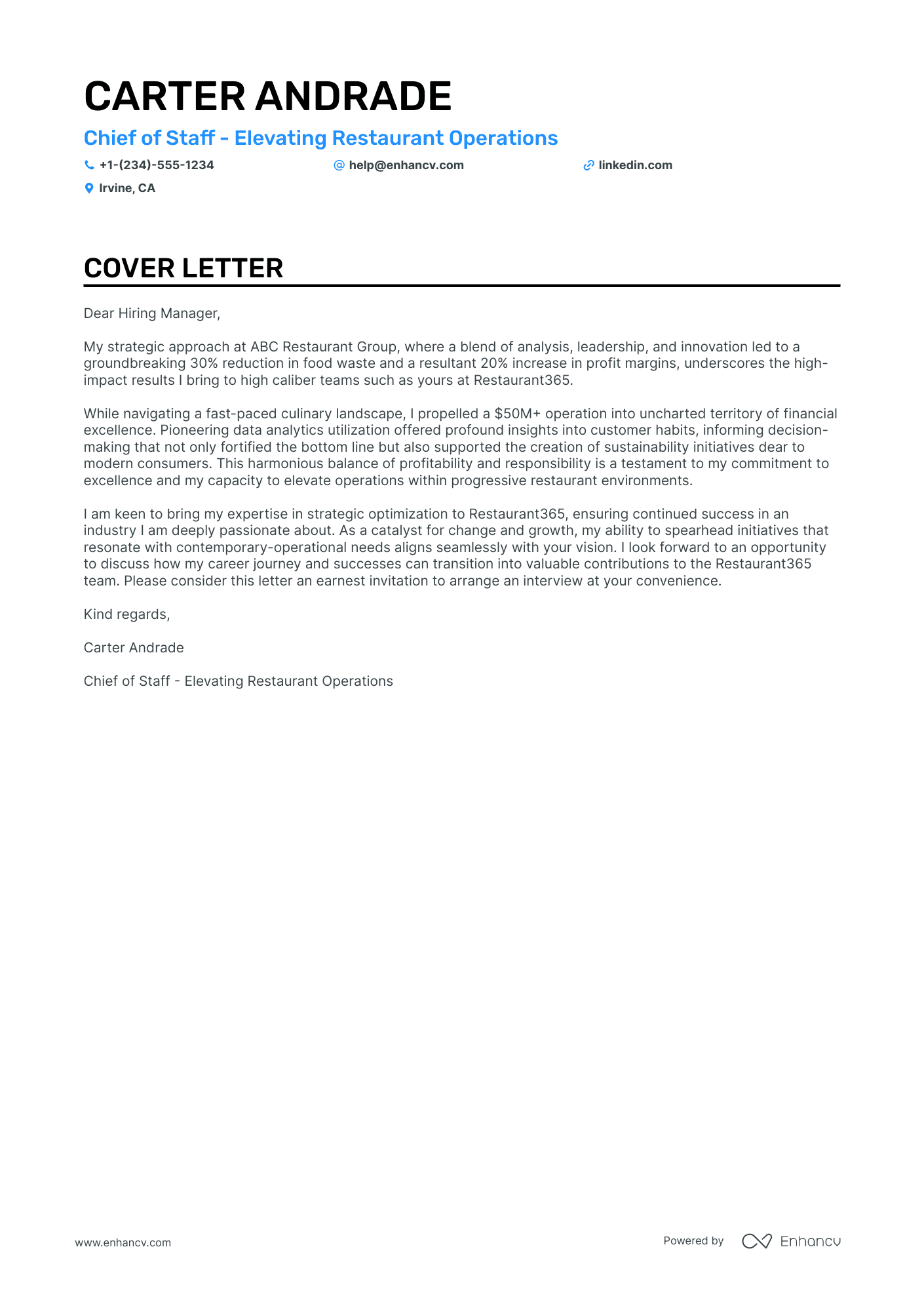
Chief of Staff
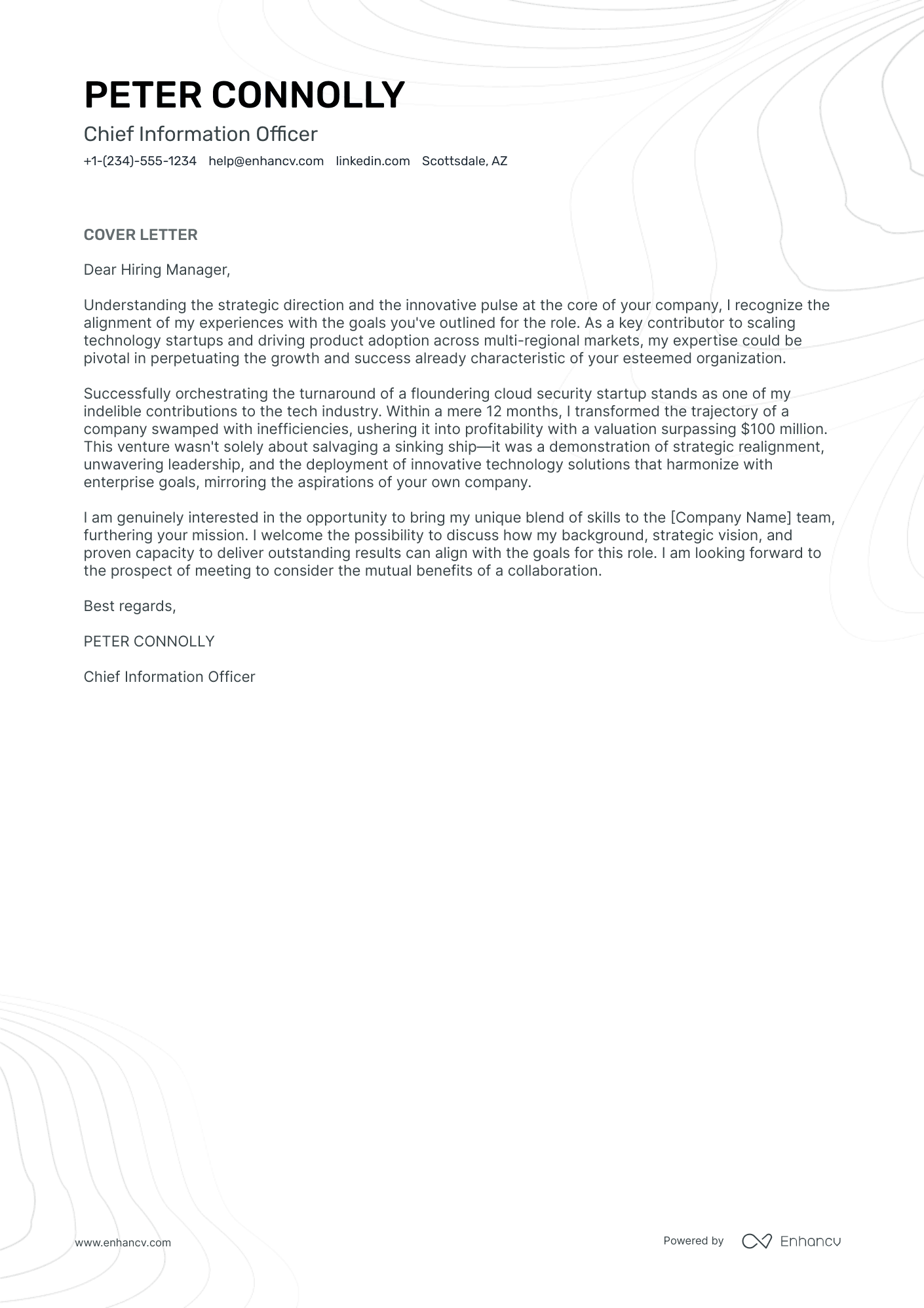
Department Head
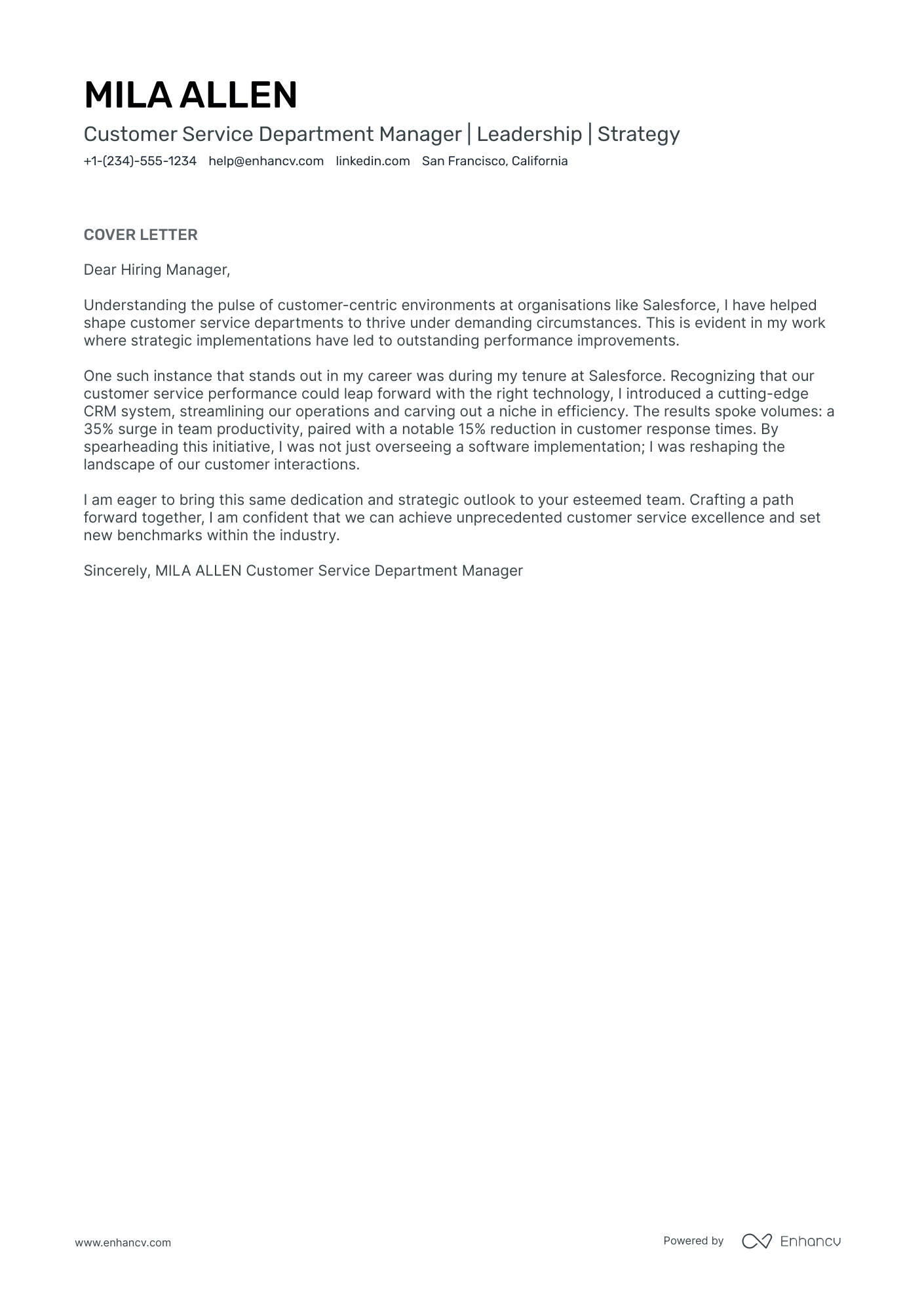
Department Manager
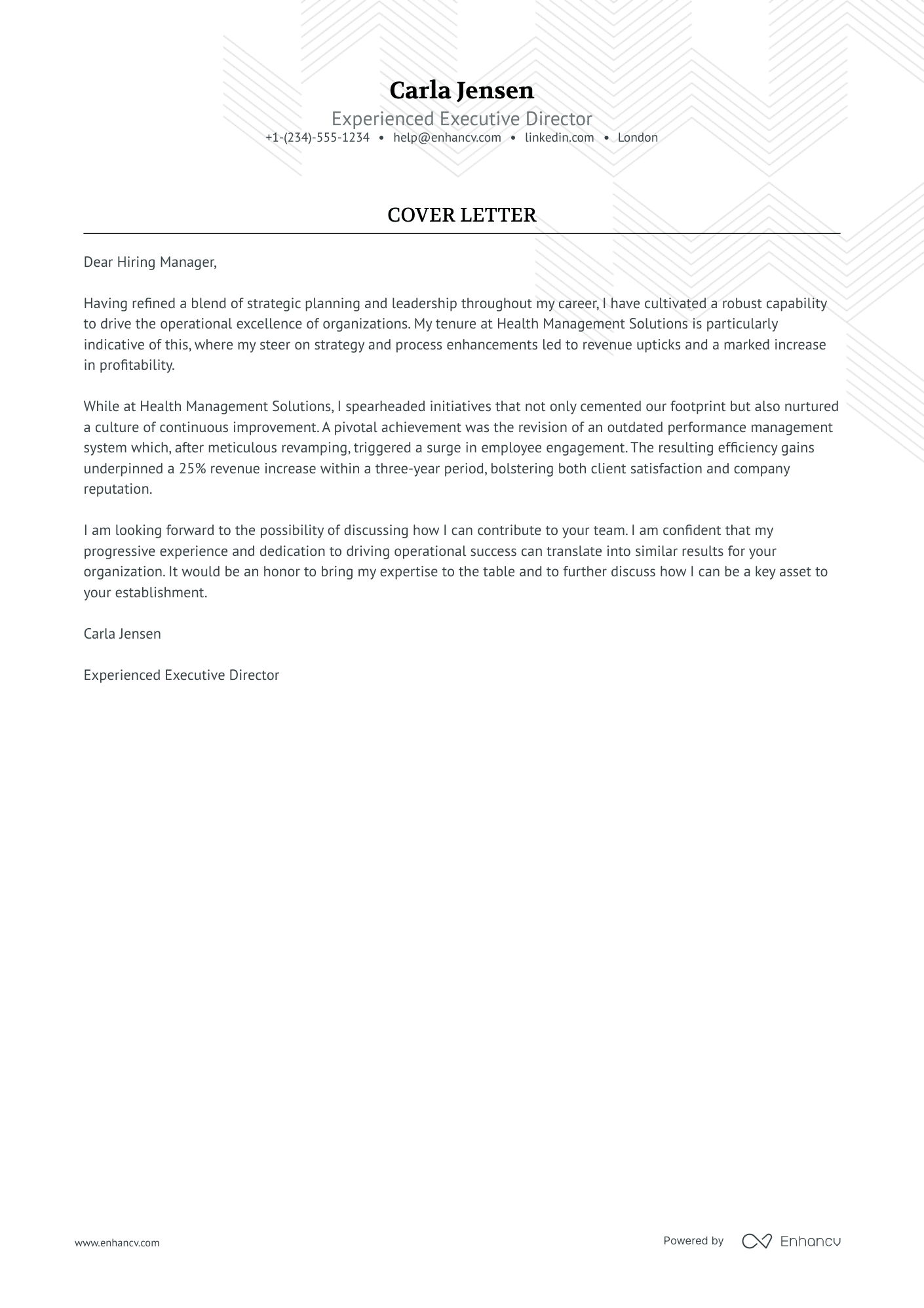
Executive Director
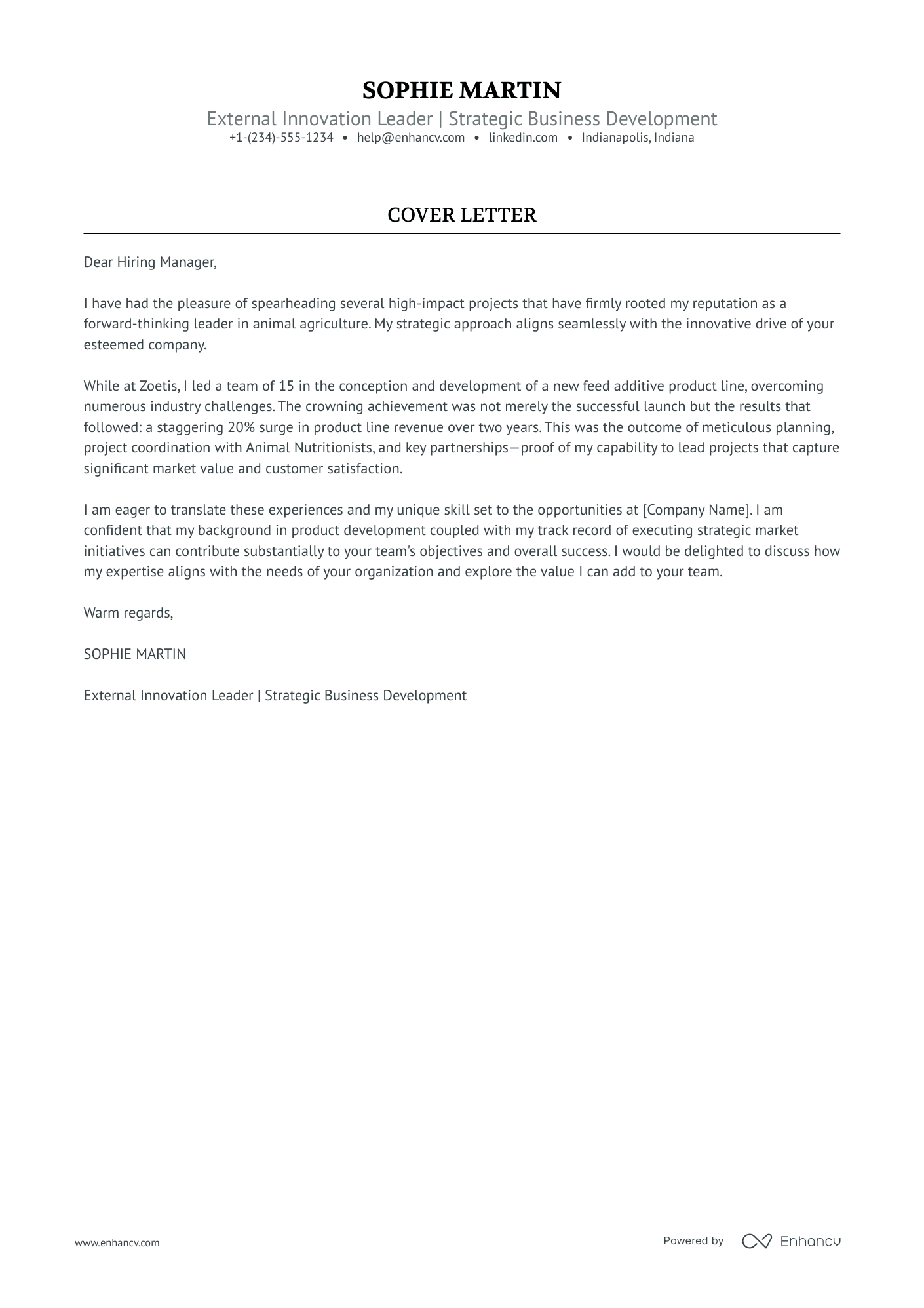
Executive Manager
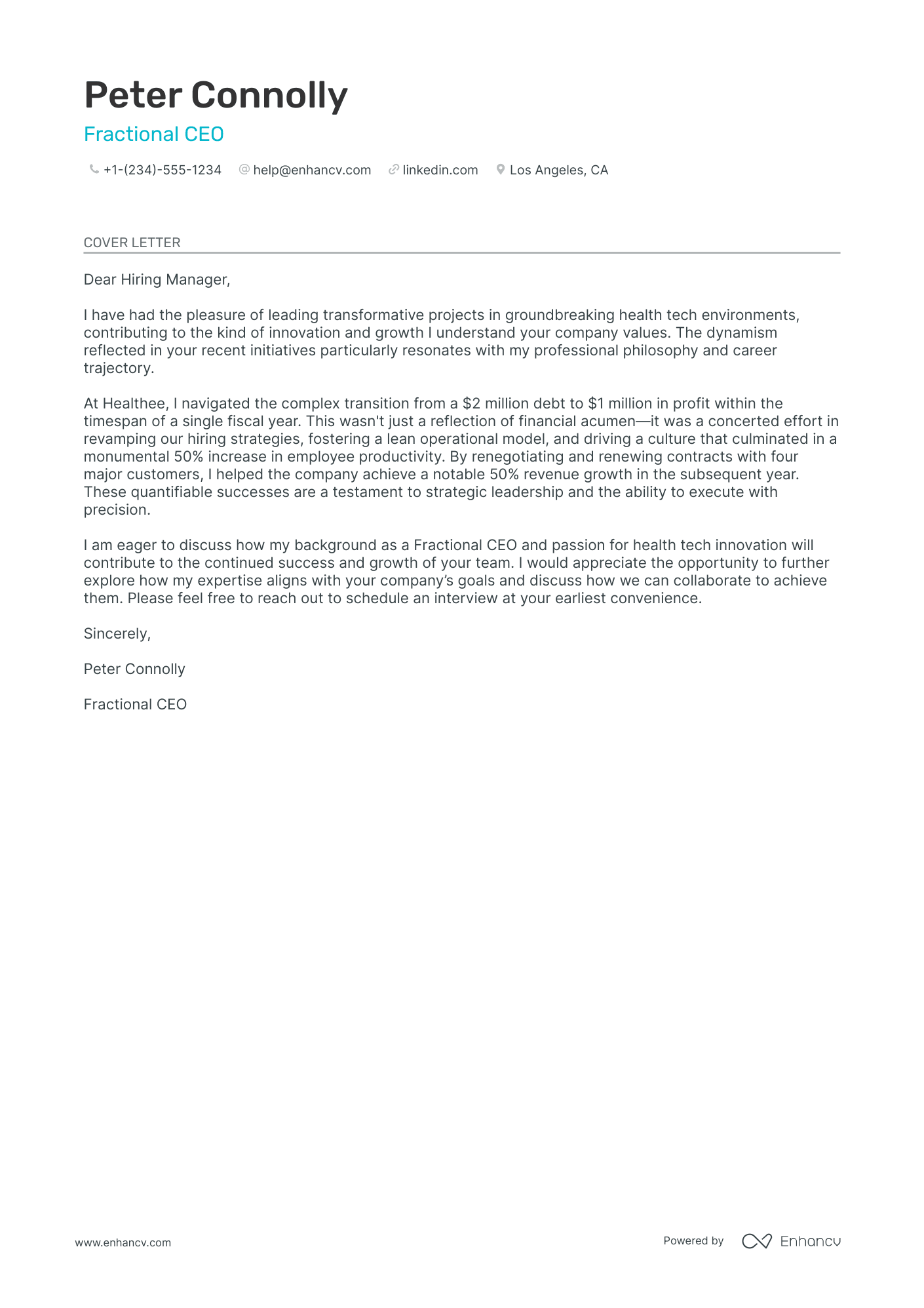
Fractional CEO
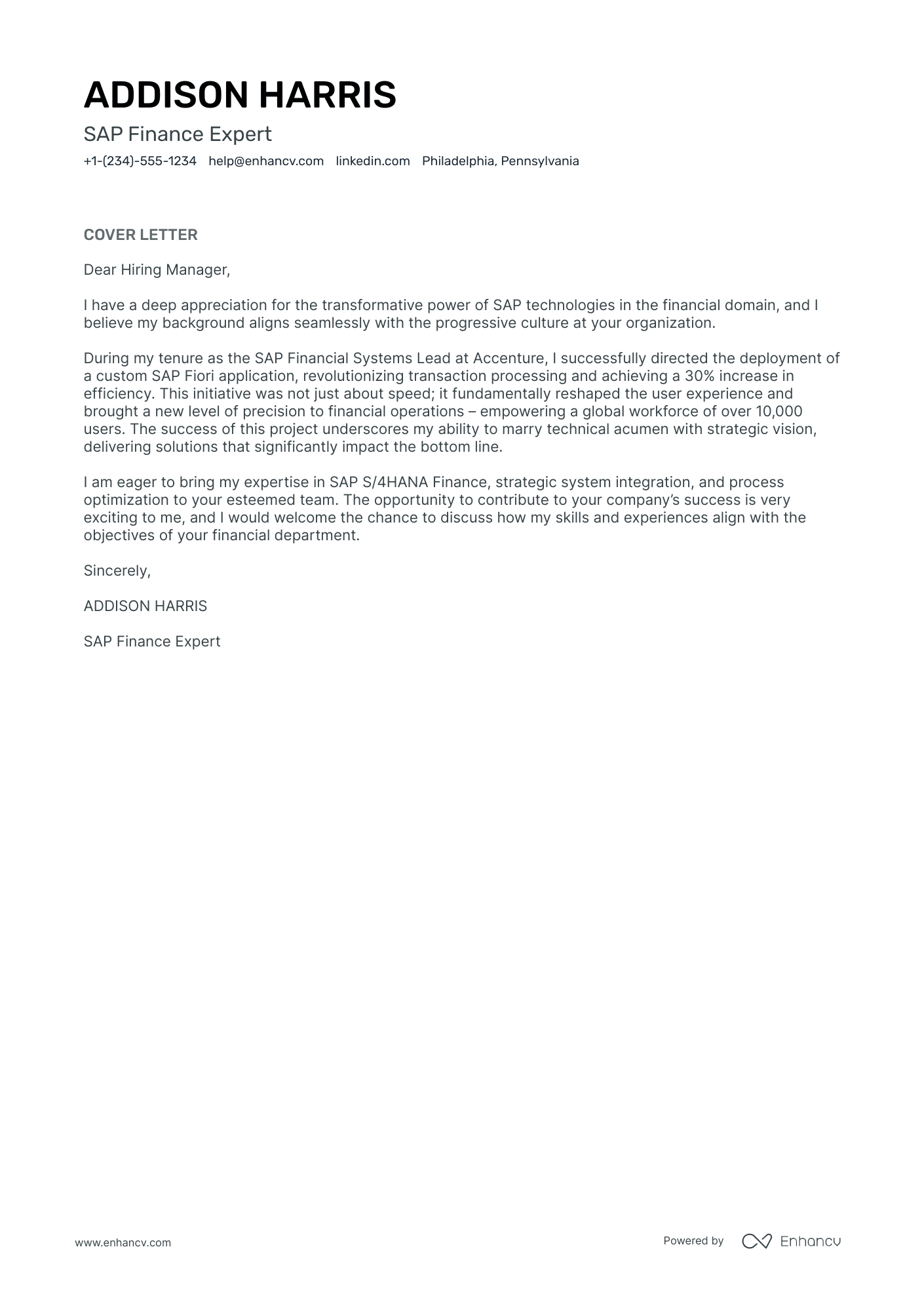
Functional Manager
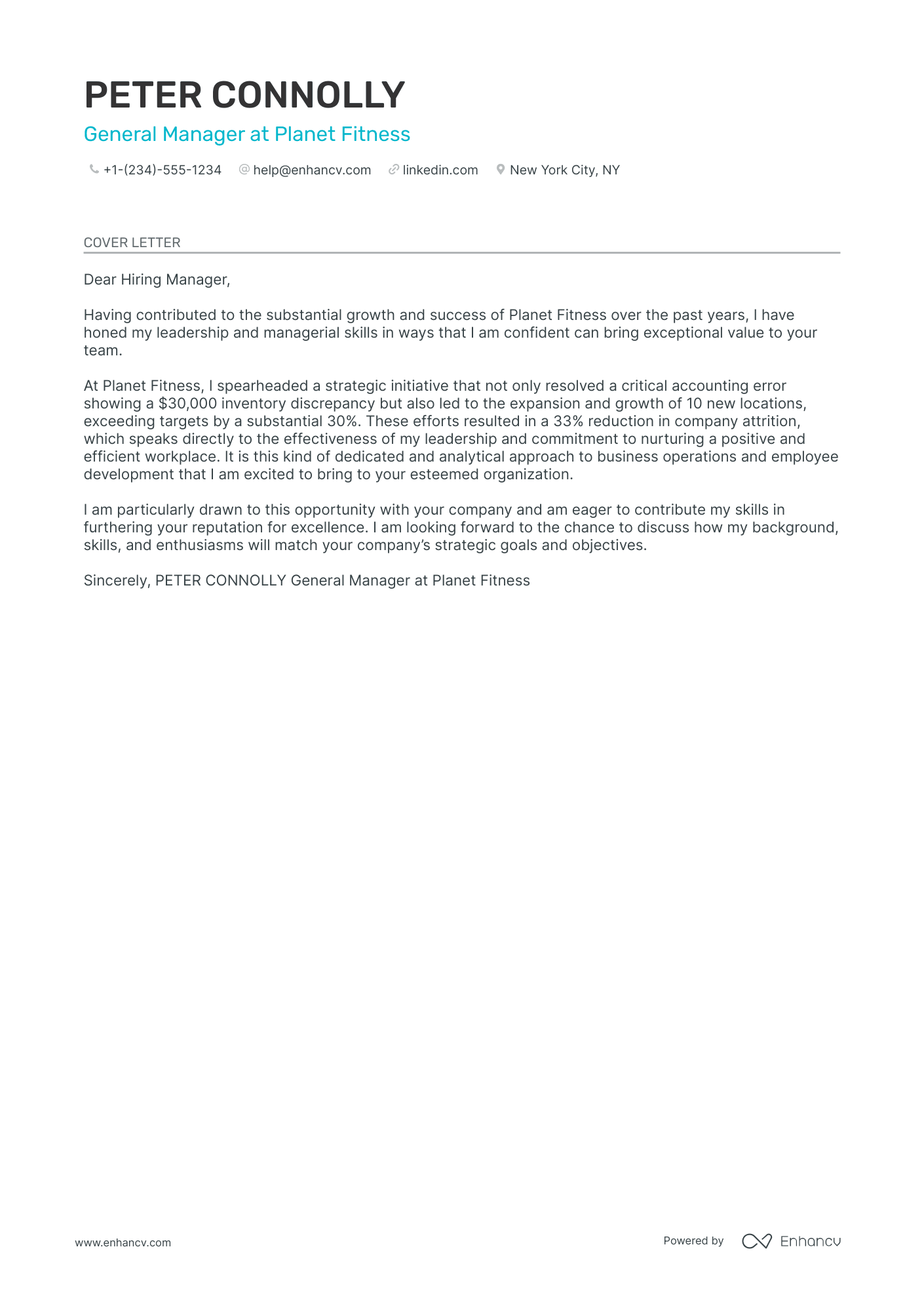
Vice President
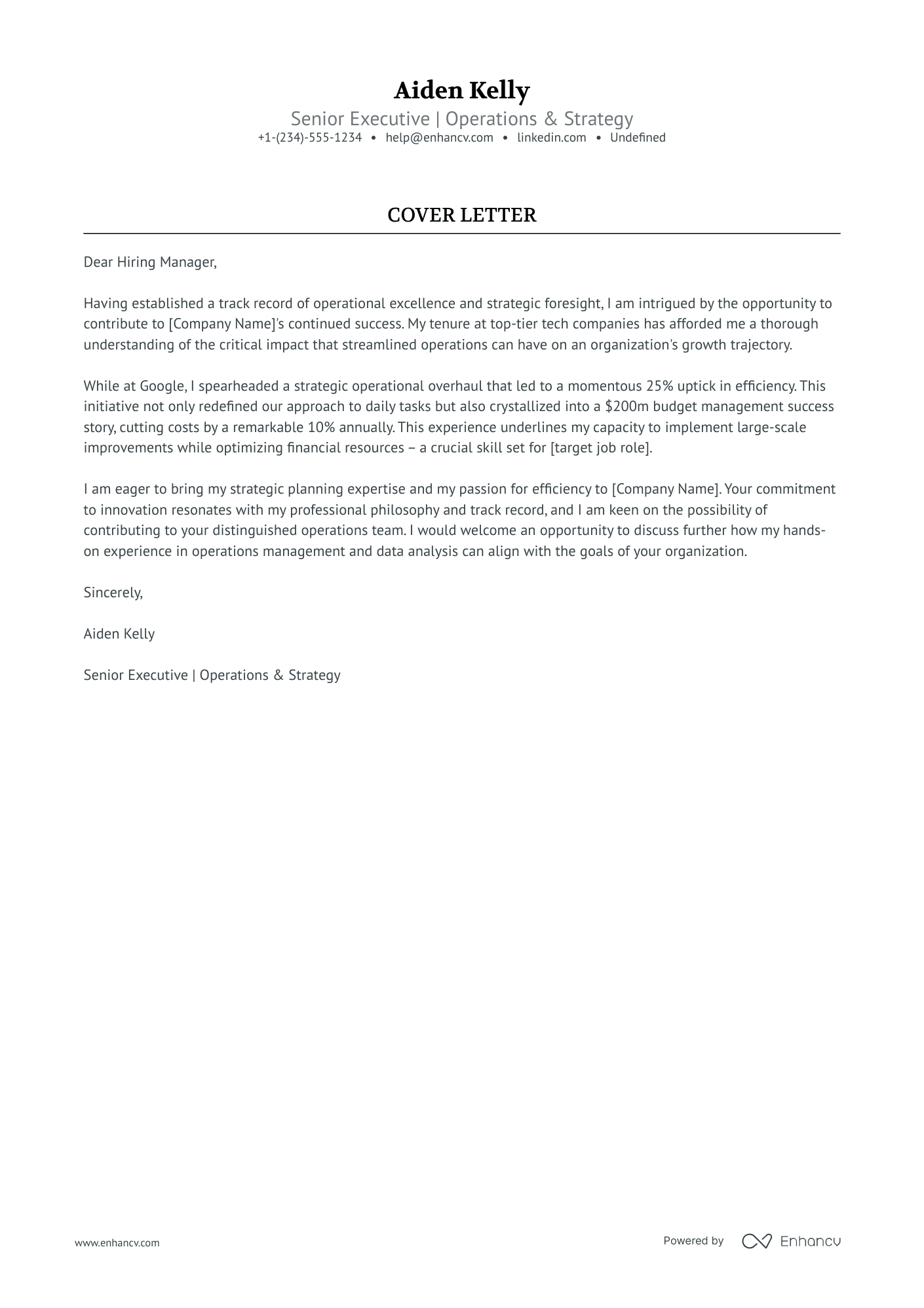
Board of Directors
Cover letter guide.
Executive Cover Letter Sample
Cover Letter Format
Cover Letter Salutation
Cover Letter Introduction
Cover Letter Body
Cover Letter Closing
No Experience Executive Cover Letter
Key Takeaways
By Experience

Starting your job hunt, you've hit a snag: crafting an executive cover letter that stands out. It's not just a repeat of your resume—it's your chance to showcase a shining professional moment, woven into a compelling narrative. Yet, the task can be daunting. How do you strike the perfect balance of formality without falling into the trap of tired clichés? Keep it concise; one page is your limit. Let's unravel these challenges and help you pen an executive cover letter that captivates and convinces.
- Personalize your executive cover letter and get inspired by other professionals to tell a compelling story;
- Format and design your executive cover letter to make an excellent first impression;
- Introduce your best achievement in your executive cover letter to recruiters;
- How to make sure recruiters get in touch with you, using your executive cover letter greeting and closing paragraphs.
What is more, did you know that Enhancv's AI can write your cover letter for you? Just upload your executive resume and get ready to forward your job application in a flash.
If the executive isn't exactly the one you're looking for we have a plethora of cover letter examples for jobs like this one:
- Executive resume guide and example
- CIO cover letter example
- Chief Executive Officer cover letter example
- Fractional CEO cover letter example
- Board of Directors cover letter example
- Functional Manager cover letter example
- Managing Director cover letter example
- Chief Human Resources Officer cover letter example
- Director cover letter example
- Director of Finance cover letter example
- Assistant Branch Manager cover letter example
Executive cover letter example
Jordan Smith
San Francisco, California
+1-(234)-555-1234
- Emphasizing previous leadership experience and the successful management of a sizable team highlights the applicant's capability to handle responsibility, a crucial aspect for managerial roles.
- Detailing a specific achievement, such as the development of a strategic communication plan that resulted in a measurable increase in brand visibility, showcases the applicant's ability to deliver results and their expertise in strategic planning.
- Expressing the desire to apply past experience to drive growth and explore new opportunities demonstrates forward-thinking and an understanding of the need for innovation in technology-related positions.
- Demonstrating an understanding of the value of strategic media relations in the technology sector suggests specialized knowledge that is directly relevant to the role they are applying for.
What about your executive cover letter format: organizing and structuring your information
Here is one secret you should know about your executive cover letter assessment. The Applicant Tracker System (or ATS) won't analyze your cover letter.
You should thus focus on making an excellent impression on recruiters by writing consistent:
- Introduction
- Body paragraphs (and explanation)
- Promise or Call to action
- Signature (that's optional)
Now, let's talk about the design of your executive cover letter.
Ensure all of your paragraphs are single-spaced and have a one-inch margins on all sides (like in our cover letter templates ).
Also, our cover letter builder automatically takes care of the format and comes along with some of the most popular (and modern) fonts like Volkhov, Chivo, and Bitter.
Speaking of fonts, professionals advise you to keep your executive cover letter and resume in the same typography and avoid the over-used Arial or Times New Roman.
When wondering whether you should submit your executive cover letter in Doc or PDF, select the second, as PDF keeps all of your information and design consistent.
The top sections on a executive cover letter
- Header: This section includes the candidate's contact information, the date, and the employer's details, which is crucial for establishing a professional tone and ensuring the letter reaches the appropriate person.
- Opening Greeting: A personalized salutation addresses the hiring manager directly, demonstrating the candidate's attention to detail and respect for proper business etiquette.
- Executive Summary: This introductory paragraph should showcase the candidate's high-level experience and strategic vision, aligning with the executive role's requirement for leadership and decision-making capabilities.
- Leadership and Achievements: A dedicated section to highlight past leadership experiences, quantifiable accomplishments, and the impact on previous organizations, which is essential for an executive position.
- Call to Action and Closing: A strong concluding statement that invites further discussion and expresses enthusiasm for the role, leaving a lasting impression on the recruiter and reinforcing the executive's proactive approach.
Key qualities recruiters search for in a candidate’s cover letter
- Strategic vision and foresight: To demonstrate the ability to steer the company towards future growth and to anticipate industry trends.
- Leadership and team-building skills: To show that the executive can inspire, manage, and unify teams to achieve company goals.
- Proven track record in achieving results: To provide evidence of past accomplishments and successes in improving company performance, meeting targets, and driving growth.
- Financial acumen: To emphasize the capability to manage budgets, investments, and financial strategies efficiently.
- Relationship-building and networking abilities: To illustrate the potential to cultivate partnerships, negotiate deals, and represent the company in various circles.
- Adaptability and crisis management: To indicate readiness to handle change, resolve conflicts, and guide the company through challenging times.
What greeting should you use in your executive cover letter salutation
A simple "Hello" or "Hey" just won't work.
With your executive cover letter salutation , you set the tone of the whole communication.
You should thus address the hiring managers by using their first (or last name) in your greeting.
But how do you find out who's recruiting for the role?
The easiest way is to look up the role on LinkedIn or the corporate website.
Alternatively, you could also contact the organization via social media or email, for more information.
Unable to still obtain the recruiter's name?
Don't go down the "To whom it may concern path". Instead, start your cover letter with a "Dear HR team".
List of salutations you can use
- Dear [Hiring Manager's Name],
- Dear [Mr./Ms./Dr. Last Name],
- Dear [Search Committee or Department Name],
- Dear [Title/Position],
- Dear Hiring Team,
- Dear [Company Name] Team,
First introductions in your executive cover letter
Within your executive cover letter introduction , genuinely state what you like about the organization.
Research the latest company projects, honorary awards, company updates, etc.
Write up to two sentences to let recruiters know what impresses you about the company,
This would help you to set a good tone for the rest of the communication.
What comes next: your executive cover letter middle paragraphs
In the next three to six paragraphs (or the body of your executive cover letter) you have to prove your unique value .
Most candidates tend to mess up at this stage. They tend to just copy-paste information from their resume.
That's one big no-no.
Remember that when writing your executive cover letter, it has to be personalized. And, your ultimate aim is to catch the recruiter's eye.
So, look back on key job requirements and write down a list that includes the ones you cover.
Next, select just one key achievement from your professional (or personal) history that meets those advert keywords.
Narrate a story around how you've grown your skill set and knowledge. Also, aim to show the unique understanding or soft skills you bring about, thanks to your past success.
Final words: writing your executive cover letter closing paragraph
The final paragraph of your executive cover letter allows you that one final chance to make a great first impression .
Instead of going straight to the "sincerely yours" ending, you can back up your skills with a promise of:
- how you see yourself growing into the role;
- the unique skills you'd bring to the organization.
Whatever you choose, always be specific (and remember to uphold your promise, once you land the role).
If this option doesn't seem that appealing to you, close off your executive cover letter with a follow-up request.
You could even provide your availability for interviews so that the recruiters would be able to easily arrange your first meeting.
Addressing limited to no experience in the executive cover letter
There's nothing to worry about if you lack professional experience .
Your executive cover letter could bridge the gaps in your professional history by focusing on what matters most to recruiters, that's either:
- skills - focusing on transferable ones you've gained, thanks to your life experience (e.g. volunteering, certificates, etc.);
- achievements - select the most relevant and noteworthy one from your history (e.g. education, projects, etc.);
- motivation - describe how you envision your professional growth in the next up to five years, thanks to this opportunity.
Key takeaways
Writing your executive cover letter has never been easier, so remember to:
- Select a executive cover letter template that automatically meets industry formatting (e.g. has one-inch margins, is single-spaced, is in PDF, etc.);
- Make your executive cover letter personal by mentioning the recruiters' first or last name;
- Within the introduction, describe what you like best about the company in no more than two sentences;
- Use your executive cover letter body to tell a story of your greatest achievement, backed up by job-relevant skills and technologies;
- If you have no professional experience, be honest about it in your executive cover letter, but also write about your unique talents.
Executive cover letter examples
Explore additional executive cover letter samples and guides and see what works for your level of experience or role.

Cover letter examples by industry

AI cover letter writer, powered by ChatGPT
Enhancv harnesses the capabilities of ChatGPT to provide a streamlined interface designed specifically focused on composing a compelling cover letter without the hassle of thinking about formatting and wording.
- Content tailored to the job posting you're applying for
- ChatGPT model specifically trained by Enhancv
- Lightning-fast responses

Updating Your LinkedIn Profile: Why, When, and How to Add Your New Job?
Can you put future jobs on resume, how to name drop in a cover letter, keep getting rejected job applications 16 resume mistakes you’re probably making, canadian resume format & how-to guide for 2024, how to write cold emails for job opportunities.
- Create Resume
- Terms of Service
- Privacy Policy
- Cookie Preferences
- Resume Examples
- Resume Templates
- AI Resume Builder
- Resume Summary Generator
- Resume Formats
- Resume Checker
- Resume Skills
- How to Write a Resume
- Modern Resume Templates
- Simple Resume Templates
- Cover Letter Builder
- Cover Letter Examples
- Cover Letter Templates
- Cover Letter Formats
- How to Write a Cover Letter
- Resume Guides
- Cover Letter Guides
- Job Interview Guides
- Job Interview Questions
- Career Resources
- Meet our customers
- Career resources
- English (UK)
- French (FR)
- German (DE)
- Spanish (ES)
- Swedish (SE)
© 2024 . All rights reserved.
Made with love by people who care.
Protect your data
This site uses cookies and related technologies for site operation, and analytics as described in our Privacy Policy . You may choose to consent to our use of these technologies, reject non-essential technologies, or further manage your preferences.
CEO & Executive Cover Letter Sample
If you are searching for a job as an executive or CEO, it's important to follow best practices for executive cover letters, including proper formatting and language. Many employers are using applicant tracking systems (ATS) to sort and screen job applications, so using a writing service that specializes in executive cover letters, like TopResume, can ensure your application sails through those systems – and doesn't get tossed in the trash.
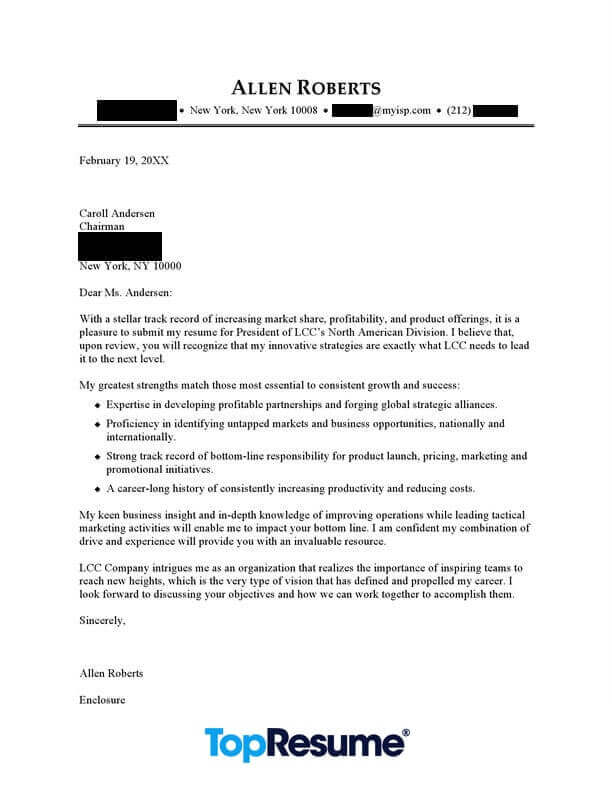
CEO & Executive Cover Letter Errors to Eliminate
As you apply to executive or CEO positions, it's important to avoid cover letter mistakes that could ruin your chances. Such errors include:
- Making unsupported claims. It's one thing to claim you're an expert at improving company profit margins and increasing revenue, but it's another to prove it. Do you have the evidence to back up your claims? You should. And it should be in your cover letter.
- It's not addressed to a specific person. Always do some digging so you can address your cover letter to a specific person. Avoid addressing your executive cover letter with “to whom it may concern” – this is an immediate red flag that you didn't take the time to research the target company.
- It's selfish. What's in it for the employer? How would hiring you benefit their company? Those are the questions your cover letter and resume should clearly answer, rather than strictly talking yourself up.
- It rambles. When applying to an executive or CEO role, it's likely you have many years of experience. However if your cover letter is borderline novel-length, it's too long. Your cover letter should be no longer than a page. Ideally, it should be somewhere between three to four paragraphs.
Do you have the cover letter that will avoid the trash pile and get you the interview? You can. Two of our resume packages (Career Evolution and Executive Priority) include cover letter writing. We guarantee you'll get 2x more job interviews within 60 days or we'll rewrite your resume for free.
The better the cover letter, the more likely the interview. Use our executive cover letter writing service today!
Samples by Category
- Executive Assistant
- Executive/CEO
- Nursing (Healthcare)
Ready to rewrite your resume?
Want a free resume analysis?
Get the information you need to land your dream job faster – delivered to your inbox, every week.
Thanks! Career advice is on its way.
Privacy preference center
We care about your privacy
When you visit our website, we will use cookies to make sure you enjoy your stay. We respect your privacy and we’ll never share your resumes and cover letters with recruiters or job sites. On the other hand, we’re using several third party tools to help us run our website with all its functionality.
But what exactly are cookies? Cookies are small bits of information which get stored on your computer. This information usually isn’t enough to directly identify you, but it allows us to deliver a page tailored to your particular needs and preferences.
Because we really care about your right to privacy, we give you a lot of control over which cookies we use in your sessions. Click on the different category headings on the left to find out more, and change our default settings.
However, remember that blocking some types of cookies may impact your experience of our website. Finally, note that we’ll need to use a cookie to remember your cookie preferences.
Without these cookies our website wouldn’t function and they cannot be switched off. We need them to provide services that you’ve asked for.
Want an example? We use these cookies when you sign in to Kickresume. We also use them to remember things you’ve already done, like text you’ve entered into a registration form so it’ll be there when you go back to the page in the same session.
Thanks to these cookies, we can count visits and traffic sources to our pages. This allows us to measure and improve the performance of our website and provide you with content you’ll find interesting.
Performance cookies let us see which pages are the most and least popular, and how you and other visitors move around the site.
All information these cookies collect is aggregated (it’s a statistic) and therefore completely anonymous. If you don’t let us use these cookies, you’ll leave us in the dark a bit, as we won’t be able to give you the content you may like.
We use these cookies to uniquely identify your browser and internet device. Thanks to them, we and our partners can build a profile of your interests, and target you with discounts to our service and specialized content.
On the other hand, these cookies allow some companies target you with advertising on other sites. This is to provide you with advertising that you might find interesting, rather than with a series of irrelevant ads you don’t care about.
Executive Manager Cover Letter Samples & Examples That Worked in 2024

Navigating the mysterious waters of writing an executive manager cover letter , you might feel like a sailor without a compass. But, did you know this particular document can be your secret weapon in the competitive job application process?

So, buckle up. Let's zero in on some helpful tips and real-world examples to take your cover letter game up a notch. With the right guidance, you'll be set to create a cover letter that's clear, compelling, and highly effective.
Read on and learn about:
- Formatting your executive manager cover letter
- Building a header that stands out
- Creating a headline that succinctly captures your experience and goals
- Personalizing your greeting to suit the executive manager position
- Crafting an impactful opening statement
- Showcasing your most valuable managerial skills and accomplishments
- Concluding your cover letter with a persuasive call to action
- Avoiding common mistakes found in executive manager cover letters
- Staying informed about salary expectations and job outlook for executive managers
- Leveraging the best resources throughout your job search
1. How to properly format your executive manager cover letter
Consider your executive manager cover letter as a one-page opportunity to make an impact . Clean, clear, and concise are our watchwords as we uncover how to format your cover letter for maximum readability and effectiveness.
- Simplicity is key: Aim to fit your letter onto one page. No prospective employer wishes to embark on a Tolkien-sized reading journey.
- Font choice: Stick to professional, accessible fonts like Arial or Times New Roman, and keep the size between 10-12 points. We're all grateful when we can read without squinting.
- Space it out: Just like in a well-designed office, white space matters. Keep your margins to the standard 1 inch on all sides. A crowded cover letter can overwhelm even the most eager readers.
- Sectioning, your new best friend: Separate your thoughts clearly. Divide your cover letter into 3-4 neat paragraphs. This helps guide your reader in identifying key information quickly.
- Keep it snappy: Concise sentences keep things fresh. Aim for 15-20 words max per sentence. Your reader will thank you for this.
- Stay positive: Sign off your cover letter with a positive and forward-thinking note. Keep the glass not just half-full, but brimming.
- Professional touch: And don't forget a signature. It may feel old-school, but it adds a professional flair to the document.
That's it. Properly formatted, your executive manager cover letter should now be easier to skim than a summer beach novel. Now, let's fill in the blanks.
Create your cover letter fast with artificial intelligence.
2. how to write an effective header for your cover letter.
Let's make an impression right from the get-go. The header, which sits swaying proudly at the top of your cover letter , is where your key contact information squares off with the recipient's details — it's like a business card holding the essential details in one quick scan.
Your header should contain:
- Professional title (if applicable)
- Your address
- Contact number
- Professional email address
- Recipient’s name
- Recipient’s job title
- Company name
- Company address
Now, let's take a gander at an incorrect and a correct example:
Incorrect cover letter header example
Don Smith donathotmail.com January 30, 2023 HR Dept.
Why is this weak? It shows a notable lack of key elements. Without a professional email or full recipient details, this header would struggle to cross the basics line.
Correct cover letter header example
Don Smith Executive Manager 123 Bridge St, Albany, NY 12202 (518) 123-4568 [email protected]
January 30, 2023
To: Margaret Atkins Human Resources Manager ABC Corporation 456 Main St, Albany, NY 12203
Why does it work? In the improved version, Don's header ticks all the boxes. Complete contact information, current date, and comprehensive recipient details solidly anchor this header, giving it a professional touch.
Remember, a well-written header not only adheres to professional etiquette but also paves the way for smooth communication. It's the handshake before the conversation has even started.

3. How to craft a strong headline for your executive manager cover letter
Up next, we'll talk about the headline. Think of it as your cover letter's marquee — a mini-summary that captures the essence of who you are and what you're gunning for. Avoid vague statements. Direct and detailed always make a better impression .
A strong headline should pack in:
- Your current role or job title
- Your area of expertise or specialization
- A glimpse of your unique value proposition
To better illustrate this, let's take a look at two contrasting examples:
Weak cover letter headline example
Experienced Manager Applying for Job
Why is this headline weak? Well, it's not a misstep, but it falls flat rather quickly. It lacks specificity and does little to distinguish you from other candidates.
Strong cover letter headline example
Proven Executive Manager Specializing in Strategic Growth and Team Leadership
Why does it work? Now, this is more like it. This headline captures your role, underlines expertise in key areas, and screams "I'm what you're looking for!" without checking any cliche boxes.
Remember, a thoughtfully crafted headline could turn a quick skim into a thorough reading . It's your opportunity to cement your worth from the get-go, so seize it.
4. How to tailor the greeting on your executive manager cover letter
Confession time: Generic greetings are the sweatpants of job applications — comfy but not suitable for every occasion.
When you're aiming for an executive manager position , They deserve to be addressed properly. After all, you wouldn’t start a dialogue with, “Hey you,” would you?
Customizing your greeting by addressing the hiring manager personally sets you apart. It screams, "I've done my homework!" while giving your letter a professional and respectful tone.
But, where to find that name? Try the job description , company website , or LinkedIn . If you're a real detective, industry networking sites or press releases might hold the key.
Personalized greeting examples
Dear Mrs. Atkins, Dear Mrs. Mary Atkins, Dear Hiring Manager Mary Atkins,
But what happens if the hiring manager's name remains under wraps like a highly classified secret? In that case, stick to something professional and neutral.
General greeting examples
Dear Hiring Manager, Dear ABC Corporation Recruitment Team,
And remember, despite its past popularity, it's best to steer clear from "To Whom It May Concern." In today's job market, it can appear impersonal and antiquated. So, reserve it as a piece for the museum and opt for our suggested greetings instead.
All in all, getting the greeting right sets the tone. When opportunity doesn’t knock, let's build a door by customizing your cover letter greeting.
5. How to craft a powerful cover letter introduction
Let's set the stage with a solid introduction . In the world of letter writing, your introduction is your first pitch to the reader . Picture a networking event where you only have a handful of seconds to introduce yourself. The spotlight's on you — what's your opening line?
A captivating introduction includes:
- A concise overview of your professional history
- Relevant academic background (if applicable)
- Your reason for applying for the position
- A mention of any mutual contact or referral, if applicable
Now, let's examine three diverse scenarios,
Incorrect cover letter introduction example
I am applying for the executive manager position I found on a job board. I have vast experience in this field.
Why doesn’t it work? Well, you might as well say you like long walks on the beach. Such an introduction lacks specificity, enthusiasm, and fails to differentiate the applicant.
Correct cover letter introduction example for an experienced executive manager
Having led operational growth as an executive manager for over a decade, I was thrilled to learn of the opening at ABC Corporation from our mutual contact, John Doe. ABC’s commitment to forward-thinking strategies compliments my professional trajectory, making this opportunity an exciting prospect.
Why is this an effective intro? Here, the introduction not only ties the candidate's extensive experience to the job at hand but also establishes a shared connection, adding a personal touch while exemplifying the candidate's network within the industry.
But what if you’re fresh out of school ? If you’re wondering how to make an instant impact with your executive manager cover letter, here’s an example tailored for you.
Correct cover letter introduction example for a fresh graduate
As a business management graduate from XYZ University with substantial internships at eminent establishments, I’m eager to apply my learned acumen to the executive manager position at ABC Corporation. A passionate believer in encouraging innovation, I find ABC’s forward-thinking approach appealing.
Why does it work? This opening strikes gold for a fresh graduate. It highlights relevant education and internships, while also establishing a connection with the company's values.
Whether you're an industry veteran or a fresh talent, your introduction can make or break the reader's interest. And so, like a primetime telecast intro, make it worth sticking around for.

6. How to highlighting your top skills and accomplishments
Once you've set the stage with a firm handshake of an introduction, it's time to walk the talk. The body of your cover letter can be likened to the core of your conversation.
It is here you substantiate your headline and introduction with the ripe fruits of your skills and accomplishments .
For an executive manager cover letter, emphasis on leadership and organization, strategic planning, excellence in communication, project management, and teamwork can set you apart from the crowd.
Here are some skills you might want to mention in your cover letter
- Strategic planning and execution
- Leadership and team management
- Budget development and oversight
- Business development
- Client relationship management
Let's take a look at an example of a cover letter body from an experienced executive manager seeking a new challenge:
Cover letter body paragraph example for an experienced executive manager
As the Executive Manager at XYZ corporation, I led my team to surpass productivity targets by 30% for three consecutive quarters, a performance improvement linked to the strategic plans I implemented. I also spearheaded a client engagement initiative which bolstered customer retention by 20% within six months.
Why does it work? This paragraph shows clear evidence of leadership, strategic planning, and client relations skills — all critical for an executive manager role.
Ah, but what if you're a greenhorn in the executive manager field? Fear not. A fresh graduate can focus on skills garnered during internships , academic projects , part-time jobs , or extracurricular activities .
It's about demonstrating transferable skills — those valuable nuggets that may not be job-specific but are certainly job-relevant.
Cover letter body paragraph example for a recent graduate
During a summer internship at ABC Corporation, I collaborated on a project which optimized workflow efficiency, saving 10 hours of work per week. As a final year student, I led a team of five members for a business analysis project that proposed strategic solutions for a local small business, grading us an A+ for the effort.
Why is it effective? This paragraph showcases teamwork, leadership, strategic thinking, and practical application of business knowledge, making it relatable to the executive manager’s role, despite the lack of formal job experience.
So, whether you're a seasoned professional or just starting your journey, remember — the body of your cover letter is where you transform 'who you are' into 'why you're the right pick.' Think of it as painting a picture that makes the viewer want to invest in the artist. Make every stroke count!
Find out your resume score!


7. How to end your executive manager cover letter persuasively
The conclusion of your cover letter is your final opportunity to hover on the reader's mind long after they've swiveled away from your application.
A persuasive conclusion should include:
- A direct, executive-style summary of your pitch
- How and when you can be best contacted
- A statement manifesting your initiative to follow up
- And of course, a courteous, professional sign-off
Let's explore two examples — one with room for improvement, and another that hits the right notes:
Incorrect cover letter conclusion example
I believe I could be a good fit for your team, do get in touch if you feel the same. Look forward to hearing from you.
[Your Name]
Why is this a weak conclusion? While this conclusion isn't egregious, it falls into the trap of being too passive and lacks a clear follow-up plan, making it seem more like a hopeful wish than an assertive closing statement.
Correct cover letter conclusion example
In conclusion, my strategic leadership skills and proven track record of driving operational growth make me a strong fit for the Executive Manager role at ABC Corporation.
I'm eager to discuss how I may contribute to your goals. I’ll follow up with your office next week to explore the possibility of scheduling a meeting.
Thank you for your time and consideration.
Why is this a strong conclusion? This one hits the sweet spot. It summarizes the candidate's pitch, specifies follow-up plans, offers thanks, and ends in a professional note.
Crafting the conclusion of your executive manager cover letter is akin to the closing arguments in a court case — it should drive your point home convincingly.
8. How to avoid common mistakes on your executive manager cover letter
Navigating the labyrinth of cover letter writing, you might just trip over a stumbling block or two. Fear not, we're here to help you sidestep the common pitfalls that could blemish your executive manager cover letter.
Here are some common landmines and how you can steer clear of them:
- Lengthy narration: Stay away from turning your cover letter into an autobiography. Keep it concise, relevant, and remember — it's not about your life story; it's about what you bring to the table.
- Lack of customization: A one-size-fits-all cover letter screams laziness. Tailor each cover letter to the specific company and role.
- Rehashing your resume: Avoid repeating your resume in prose. Instead, build a narrative that underscores your skills and achievements in a new light.
- Passive voice: Stick with active voice for a more direct, compelling tone.
- Typos and grammar errors: As much it pains to state the obvious, sloppy errors can shoot your chances in the foot. Proofread , use spell-check, then proofread again.
Remember, your cover letter isn't just a formality; it's potentially your ticket to a job interview. Keep it clean. Keep it sharp.
9. Average salary and job outlook for executive managers
Navigating the career landscape as an executive manager? Let's talk numbers. According to recent data from the Bureau of Labor Statistics , the average yearly salary for executive managers was $100,090 as of May 2022. Not bad for navigating the corporate seas, right?
But let's not stop at the dollar signs. The potential growth in this field also paints an encouraging picture. Employment for top executives, which includes executive managers, is projected to grow 3 percent from 2022 to 2032. To put it in perspective, that's on par with the average growth rate for all occupations.
If you're looking to navigate the sea of opportunities, there's more good news. An average of 311,600 job openings for top executives are projected each year over the coming decade. So it appears the winds are set fair for a journey into executive management.
Remember, these are averages and real salaries can vary widely depending on industry, location, experience, and the size of the company. Still, it offers a general lay of the land as you plot your career course.
10. Job seeking resources for executive managers: A simple roadmap
Embarking on the job hunt in the world of executive management isn't for the faint of heart, but a well-prepped applicant can turn it from an odyssey into a strategic exercise. The key is knowing where to look.
- Executive job boards: Websites like Executives On The Web , Exec-appointments.com , and TheLadders are brimming with executive roles. You'll find positions across industries from healthcare to finance, retail to technology. Each site offers filters — such as location, sector, or salary range — to streamline your job search. Another plus? These sites often present global opportunities.
- LinkedIn: More than half a billion people use LinkedIn to advance their careers. It's an ocean of possibilities. It's not just job postings, which can be filtered by location, industry, and job function. It’s about building a network of industry movers and shakers, sharing your expertise, and establishing your brand in the management field.
- Executive headhunters: These talent-scouting wolves are contracted by organizations to find your sheep-like excellence in the wilderness. Agencies like Korn Ferry , Heidrick & Struggles , and Spencer Stuart specifically deal with management and executive-level positions. They have inside information on positions that are often never advertised publicly.
- Industry events: Platforms like Eventbrite and MeetUp , or industry-specific association websites, list a wealth of networking events, conferences, and workshops.
- Professional development courses: Upskilling never goes out of style in the world of executive management. Platforms like Coursera , Udemy , and Harvard Business School Online offer high-quality courses designed to refresh your skillset and stay abreast of industry trends. Whether it's leadership strategies or data analytics, continuous learning could just be the propeller speeding up your next job pursuit.
Keep in mind, job searching is more of a journey than a one-time event. Set your course with your polished resume , optimized LinkedIn profile , and updated industry knowledge. Happy job hunting, executive managers!
Executive Manager Cover Letter FAQ
Aim to keep your cover letter concise and to the point. Usually, three to four succinct paragraphs are enough to convey your message effectively without losing the reader's attention.
While it's crucial to let your personality shine in your cover letter, humor can be subjective. Use it sparingly and wisely – ensuring it aligns with the nature and culture of the company you're applying to.
Yes, each cover letter should be customized to the specific role and company you're applying to. Highlight the skills and experiences most relevant to each position.
Unless the job application specifically asks for your salary expectations, it's best to leave that discussion for a later stage in the process where you can negotiate after gauging interest.
Be honest about your employment history. If there are short stints, focus on the range of experiences and skills you have acquired through these

Martin Poduška
Martin is a resume expert and career advice writer at Kickresume. In his five years at Kickresume, he has written hundreds of in-depth, painstakingly researched resume advice articles and, as chief editor, he has also edited and revised every single article on this website. Tens of thousands of job seekers read Martin’s resume advice every month. He holds a degree in English from the University of St Andrews and a degree in Comparative Literature from the University of Amsterdam .
All management cover letter examples
- Product Manager
- Project Manager
- Risk Manager
- Strategic Manager
All executive manager cover letter examples

Related executive manager resume examples

Let your resume do the work.
Join 5,000,000 job seekers worldwide and get hired faster with your best resume yet.

- Career Blog
Executive Director Cover Letter: 10 Examples & Writing Tips

If you’re vying for the position of an executive director, your CV alone might not cut it. Chances are you will need to submit a well-written cover letter to stand out from the crowd. A cover letter is an excellent opportunity to showcase your skills, qualifications, and overall suitability for the job. Not to mention, it can help you create a positive first impression with your potential employer.
The purpose of this article is to provide you with handy actionable tips and examples to help you understand what goes into creating a winning executive director cover letter. We’ll examine ten real-life examples of successful executive director cover letters that landed actual candidates their dream jobs. We’ll also be sharing valuable insights and best practices to help you craft an attention-grabbing cover letter that highlights your qualifications and expertise.
Whether you’re a seasoned professional looking to climb the corporate ladder or someone starting their career journey in this field, this article will offer you valuable insights to create a compelling executive director cover letter. Read on to learn more!
Research and Preparation
The first step in writing an effective Executive Director cover letter is to thoroughly research the company and the specific position for which you are applying. This means studying the company’s history, values, mission, and vision. It also means identifying the key qualifications and requirements for the job.
Study the company and position
To effectively study the company and position, you can start by reviewing the company’s website, social media channels, and news articles about the company. This will give you an understanding of the company’s products or services, its customers, and its industry. You can also look for information on the company’s leaders, culture, and values.
In addition, review the job description carefully to identify the specific qualifications and experience required for the role. Look for keywords and phrases that match your own experience and skills. This will help you tailor your cover letter to the specific needs of the company and position.
Identify key qualifications and requirements
Once you have a clear understanding of the company and position, you can identify the key qualifications and requirements for the job. Make a list of the skills, experience, and education required for the role, and identify the ones that match your own background.
It’s important to highlight these matching qualities in your cover letter to show that you are a strong fit for the role. Be specific about how your skills and experience make you the ideal candidate for the job.
Networking and researching the company culture
Networking can be an effective way to learn more about a company’s culture and values. Reach out to any contacts you have in the company or industry and ask them about their experiences. This can give you insights into the company’s working environment, management style, and values.
You can also research the company’s culture by looking at their social media channels and employee reviews on sites like Glassdoor. This can give you an understanding of the company’s values and how they treat their employees.
By investing time in research and preparation, you can write a cover letter that stands out and shows that you are the right person for the job.
Executive Director Cover Letter Overview
An Executive Director Cover Letter is a powerful tool that applicants use to showcase their qualifications and suitability for an Executive Director position. This section will focus on the structure and format of the cover letter, its aim, and the key differences between an Executive Director Cover Letter and a resume.
Structure and Format of an Executive Director Cover Letter
An Executive Director Cover Letter follows a simple yet specific format. It starts with the applicant’s contact information, followed by a salutation, a brief introduction, the body of the letter, and finally, the closing.
- Contact information: This should include the applicant’s name, address, email address, and phone number.
- Salutation: The applicant should address the hiring manager or recruiter specifically by name.
- Introduction: The introduction should be brief and set the tone for the rest of the cover letter. It should state the position the applicant is applying for and how they found out about it.
- Body: The body of the letter is where the applicant discusses their qualifications, skills, experience, and achievements. It should be personalized to the job description and highlight the applicant’s relevant experience.
- Closing: The closing should thank the recruiter for considering the application and include a call to action, such as an invitation for an interview or a request for a follow-up call.
Aim of an Executive Director Cover Letter
The aim of an Executive Director Cover Letter is to sell the applicant’s qualifications, skills, and experience to the hiring manager or recruiter. It should persuade them to read the applicant’s resume and invite them for an interview. The cover letter should showcase the applicant’s achievements and explain how their experience aligns with the Executive Director position.
Key Differences Between an Executive Director Cover Letter and Resume
An Executive Director Cover Letter and a resume serve different purposes. While the cover letter is personalized to the job description and highlights the applicant’s qualifications for the position, the resume is a more comprehensive document that lists the applicant’s education, work experience, and professional achievements.
The Executive Director Cover Letter should focus on why the applicant is the perfect fit for the position, while the resume should provide a detailed overview of their education and professional background. While the cover letter allows applicants to show their personality and present themselves as the best candidate for the job, the resume allows them to provide a chronological overview of their professional experience.
The Executive Director Cover Letter is a vital part of a job application, and applicants should take the time to craft it carefully. The cover letter should be personalized to the job description, highlight the applicant’s achievements, and persuade the hiring manager or recruiter to invite them for an interview. When combined with an impressive resume, an Executive Director Cover Letter can increase the chances of a job offer.
Example 1: Cover Letter for Non-Profit Sector
When writing a cover letter for a non-profit executive director position, you want to demonstrate your understanding of the organization, why you are the right fit for the role, and your accomplishments in the field. Here’s an example cover letter that accomplishes all three:
Overview of the organization
I was thrilled to learn about the opportunity to apply for the Executive Director position at XYZ Non-Profit. I have a deep admiration for the organization’s mission to empower underserved communities through education and advocacy, and have followed its work for several years. I’m confident that my experience and skills align with the needs and goals of XYZ Non-Profit.
Relevance to the position
As an accomplished nonprofit leader with over a decade of experience in the education and advocacy sectors, I have a proven track record of success in advancing social justice causes. I have a deep commitment to equity and access, which is why I believe strongly in XYZ Non-Profit’s mission to promote educational opportunities for all. My experience leading strategic planning, building partnerships, and fundraising aligns perfectly with the needs of the organization.
Key Achievements and Contributions
Over the past ten years, I have played a critical role in shaping and implementing nonprofit programs that have had a significant impact in the communities they serve. As the executive director of ABC non-profit, I spearheaded efforts to increase access to higher education for low-income students. Under my leadership, the organization grew from serving 100 students a year to over 1000. I also played a key role in securing a $2 million grant from the Gates Foundation to launch a scholarship program for students in need.
At DEF Non-profit, I was able to lead a successful fundraising campaign that raised over $5 million in a year, resulting in the creation of several new programs that provided critical services to marginalized communities. Additionally, I served as the lead on a statewide advocacy campaign that successfully increased access to public transportation for low-income residents.
With my experience and passion for promoting social justice and equitable opportunities, I’m confident that I can contribute significantly to XYZ Non-Profit’s mission to empower underserved communities through education and advocacy.
Your non-profit executive director cover letter should be tailored to the specific job and organization you are applying for. By showcasing how your skills and experience align with the organization’s goals and mission, you can demonstrate why you are the best candidate for the job.
Example 2: Cover Letter for a Corporate Company
When crafting a cover letter for a corporate company, it’s important to provide an overview of the company and explain how your experience and skills are relevant to the position. Additionally, providing key achievements and contributions can showcase your value to the company.
Overview of the company
XYZ Corporation is a leading provider of innovative software solutions for businesses in a variety of industries. With over 20 years of experience and a team of highly skilled professionals, XYZ Corporation has a proven track record of helping companies improve their operations and achieve their goals.
As a seasoned executive director with over 10 years of experience in the software industry, I believe that my skills and experience are highly relevant to the position of executive director at XYZ Corporation. During my time as executive director at ABC Company, I oversaw the development and implementation of several successful software products, which resulted in a significant increase in revenue and a boost in customer satisfaction.
Key achievements and contributions
One of my key achievements during my time at ABC Company was leading the company’s shift towards a more customer-centric approach to software development. Through careful market research and a focus on meeting customer needs, we were able to develop software products that were tailored to our customers’ specific requirements. This not only led to an increase in revenue, but also helped us establish a strong reputation in the industry as a company that truly cares about its customers.
In addition, I led a team of software developers, designers, and project managers in the creation of a cutting-edge software product that received recognition from industry experts and customers alike. The successful launch of this product helped solidify ABC Company’s position as a leader in the software industry.
I am confident that my experience and achievements make me a strong candidate for the position of executive director at XYZ Corporation. I am excited about the opportunity to bring my skills and knowledge to your team and help drive innovation and growth at your company.
Example 3: Cover Letter for a Start-up
For the past __ years, I have been working as an Executive Director in various industries. While I have had the opportunity to work with a wide range of businesses, I am particularly excited about the opportunity to join an innovative start-up.
As a subject matter expert in the field of (insert relevant field), I am well-equipped to lead (company name) to new heights. The start-up’s focus on (insert start-up overview) is particularly compelling to me. I believe that my experience and knowledge aligned perfectly with the company’s goals, especially in (insert relevant position responsibilities).
Throughout my career, I have had the privilege of contributing to a wide range of business achievements, including (insert key achievements and contributions). These experiences have taught me the importance of collaboration, effective communication, and strategic planning. I am confident that my leadership style, combined with my expertise in (insert relevant field), would be an asset to the start-up.
In my current position as (insert current position), I have had the opportunity to lead teams, streamline processes, and implement new initiatives. I believe that these skills, coupled with my passion for innovation, make me an excellent fit for the Executive Director position at (company name).
Thank you for your consideration. I look forward to discussing how my skills and experience align with the goals of (company name).
Writing Tips for Executive Director Cover Letter
When crafting your executive director cover letter, it’s essential to remember that you are not the only candidate vying for the position. Therefore, you must ensure that your cover letter stands out and captures the attention of the hiring committee. Here are some writing tips to keep in mind:
Importance of Using Keywords
Including keywords in your cover letter is crucial to making it past the initial screening process. Most organizations now use an applicant tracking system (ATS) to scan resumes and cover letters for specific keywords related to the position. Therefore, it’s vital to include relevant keywords that highlight your skills and experience. Review the job description and tailor your language accordingly.
Highlighting Relevant Experience and Accomplishments
Your cover letter should focus on your experience and accomplishments, as they relate to the executive director role. Highlight your most impressive achievements that demonstrate your leadership, strategic planning, and problem-solving skills. You should also discuss how your previous experience has prepared you for this specific role in detail.
Avoiding Clichés and Generic Phrases
Avoid using clichés and generic phrases that don’t add value to your cover letter, such as “team player,” “results-driven,” and “strong communicator.” These phrases come across as insincere and overused, and they don’t provide a real insight into what makes you an exceptional candidate. Instead, use concrete examples and expressive language to create a unique elevator pitch.
The Tone of the Letter
The tone of your cover letter is critical; it gives the hiring committee insight into your personality, communication style, and professionalism. The tone should be formal, professional, and confident while still being personable. It’s important to avoid being too stuffy or casual. This approach ensures that you strike the right balance and create a lasting impression.
Your executive director cover letter must be well-written, concise, and compelling. By using keywords, highlighting relevant experience and accomplishments, avoiding clichés and generic phrases, and striking the right tone, you’ll make a strong first impression and stand out from the competition. Remember to proofread your cover letter and ensure that it’s appropriate for the position you’re applying for.
Sample Sentences and Phrases
When crafting your Executive Director cover letter, it’s important to use language that is relevant to the company and the position you’re applying for. You want to show that you understand the needs and goals of the organization, and you’re the ideal candidate to help them achieve their objectives. Here are some sample sentences and phrases to help you tailor your language to the company and position:
“I was impressed by the company’s dedication to sustainability, and I believe my experience in building successful eco-friendly initiatives can be of great value.”
“As a result of my extensive experience in fundraising, I have a proven track record of securing funding for organizations similar to [company name].”
“I have a deep understanding of [industry/sector] and have successfully navigated complex regulatory environments to achieve organizational goals.”
“I was drawn to this position because of the company’s focus on [specific mission/purpose], and I believe my skills and experience align perfectly with this vision.”
“I have a strong sense of strategic vision and have successfully led organizations through periods of growth and change.”
“With my expertise in [specific skill or area of expertise], I am confident that I can make a significant contribution to the organization’s success.”
“I have a passion for developing and mentoring teams, and I believe my experience in fostering collaboration can help elevate the organization to the next level.”
“My ability to manage complex budgets and financial analyses, combined with my experience in strategic planning, makes me an ideal candidate for this position.”
“As someone who is deeply committed to diversity, equity, and inclusion, I am thrilled to see [company name] prioritize these values.”
“My proven ability to build and maintain strong relationships with key stakeholders, combined with my experience in navigating the intricacies of [specific industry/sector], makes me uniquely qualified for this position.”
Remember, the key to a successful Executive Director cover letter is tailoring your language to the specific company and position you’re applying for. Use the above sentences and phrases as starting points, and be sure to do your research to ensure you’re speaking to the specific needs and goals of the organization.
Common Mistakes to Avoid
As an experienced copywriter and subject matter expert, it is crucial to avoid common mistakes that can harm your executive director cover letter. In this section, we will discuss some of the most common mistakes to avoid to make sure your cover letter is flawless.
Vague or Irrelevant Language
One of the biggest mistakes that candidates make in their executive director cover letter is using vague or irrelevant language. Hiring managers want to see that you have a clear understanding of the position you are applying for and how your skills and experience relate to the job. Therefore, it’s important to use specific and relevant language that demonstrates your qualifications and expertise to make you stand out among other applicants.
Highlighting Skills and Experience Not Related to the Position
Another mistake that candidates often make is including skills and experience that are not related to the position they are applying for. While it’s tempting to list all of your accomplishments, it’s essential to tailor your cover letter to the specific job you’re applying for. This means highlighting the skills and experience that are most relevant to the position and demonstrating how you meet the job requirements and qualifications.
Grammatical Errors
Grammatical errors are unacceptable in an executive director cover letter. They can make you appear careless or unprofessional, which can damage your chances of getting the job. To avoid grammar mistakes, take the time to proofread your cover letter multiple times and ask someone else to review it as well. Additionally, consider using grammar check tools to help you catch any errors you may have missed.
Avoiding common mistakes in your executive director cover letter will help you make a great impression and increase your chances of getting an interview. By using specific and relevant language, highlighting the skills and experience relevant to the position, and ensuring there are no grammatical errors, you’ll make a positive and lasting impression on the hiring manager.
Related Articles
- Recruiting Assistant Job Description: The Ultimate Guide
- Verbal Communication: Mastering the Essential Soft Skill
- Relationship Manager Job Description: Complete Guide 2023
- Maximizing Your Starting Salary: Best Strategies and Tactics
- Accountant Resume: Top Example and Tips for 2023
Rate this article
0 / 5. Reviews: 0
More from ResumeHead

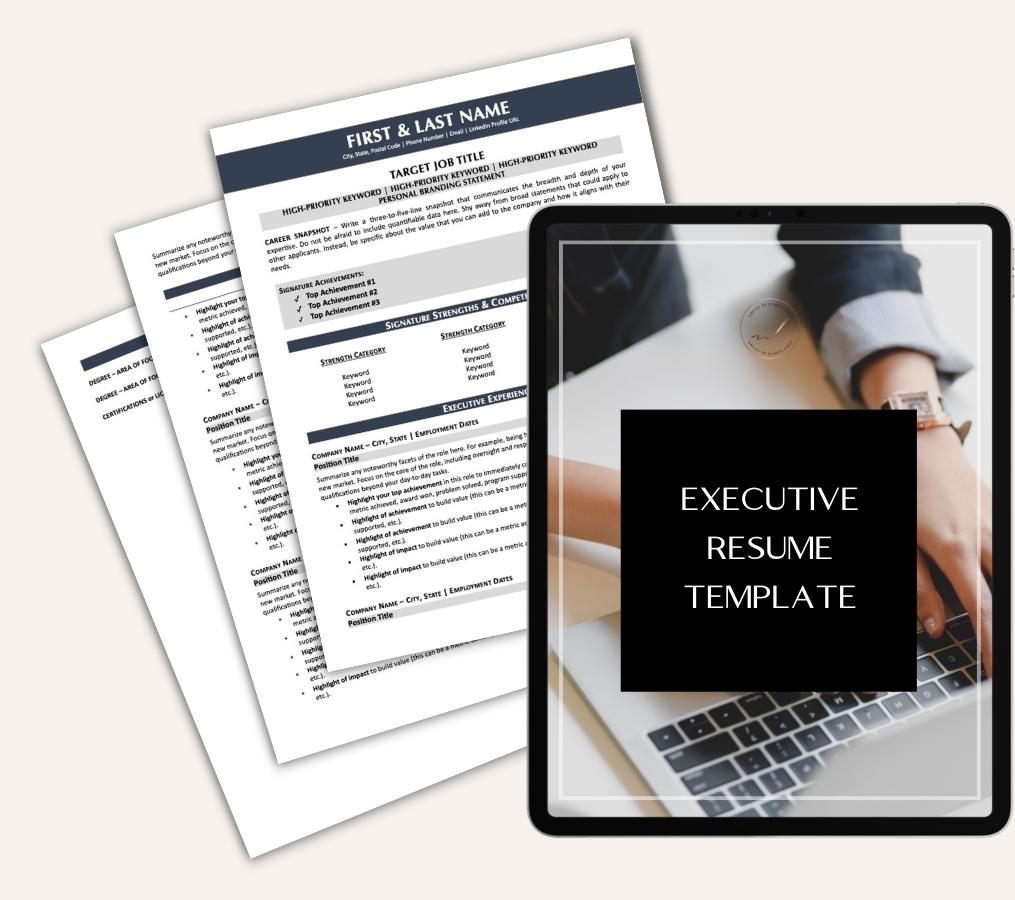
Get a FREE Executive Resume Template to help you improve your resume.

Cover Letters
5-step guide to writing executive cover letters.
Isn’t my resume enough to show my experience and value to a prospective employer? Why do I need an executive cover letter, too? You might be asking yourself these questions as you plunge headlong into a search for a new executive position.
It’s true, it is a lot of work to write a resume —and then another, and another—to ensure each is tailored for the position you’re applying to. But, no matter how much work it may seem like, you still need a strong, effective cover letter to accompany each resume you send out. Executive positions are competitive, and you need to give yourself the upper hand with a persuasive, compelling letter that makes a hiring manager want to read your resume. To help executives in the midst of a job search, I’ve written this guide to cover letters for executives.
Why Executives Need a Strong Cover Letter
A strong cover letter is so important for an executive because you simply cannot convey everything you need or want to in a two-page resume or even a three-page resume. As an executive, you have plenty of professional experience to discuss, and will probably need to leave things off your resume even after you’ve culled down your skills and accomplishments to the most relevant for the targeted position.
When you write a cover letter, you can address accomplishments or work experiences that aren’t directly mentioned in your resume, or expand on the information provided in your resume.
However, a strong cover letter should never just act as an extension of your resume. Instead, a strong executive cover letter should accomplish the goals of telling a prospective employer why you are a good fit for their company, what you can do for them, and why they should pay closer attention to your resume than they might pay to the resume of another applicant. Remember, a recruiter or hiring manager will only spend a few seconds skimming your resume—but a strong executive cover letter will help compel them to spend more time with yours.
As I explain in this article , it’s especially important that you have a strong executive cover letter if you are pitching a company for a job that isn’t posted so you can explain why you are sending your resume and why you think the company could benefit from employing you. Plus, regardless of whether the job is posted or not, two-thirds of hiring managers and executives do read cover letters. Better safe than sorry when it comes to those kinds of numbers.
However, many executives may think that they don’t need a cover letter because they already know the prospective employer who will be reviewing their resume. You may know them, and they may be familiar with your career and your accomplishments—but the same is probably true of other applicants. Don’t take any shortcuts with your career, and don’t make any assumptions about where you stand with a prospective employer.
A strong executive cover letter is important for showing that you care enough about the position to put the effort into writing one—and it’s important for the actual content of the letter itself. As I’ve already mentioned, an executive cover letter needs to communicate your professional personality and why you are a good fit for the position. If you do this, and do it well, your resume is far more likely to get the attention it deserves and get you an interview.
Action verbs and high-impact phrases are equally important in your resume and cover letter. If you need a reference list download this free PDF with 178 action verbs and high-impact phrases that will improve your resume and cover letter.
How a Great Cover Letter Can Help Executives Land a Job
A great cover letter separates the motivated and truly interested candidates from those who are just applying because the job looked like something they’d be qualified for. Yes, it’s necessary to have an executive cover letter in addition to your resume because it’s expected that you have one, but it’s also necessary because it can help you land a job by providing additional, relevant, and interesting information about your experience, your brand, and your interest in the position.
When a hiring manager is considering applicants, they want to know that an applicant is truly invested, or will be truly invested, in the company if hired. A great cover letter will show how and why you will be an asset to the company and encourage a hiring manager to take your resume very seriously.
Overall, a cover letter plays the role of being your introduction and first impression for a recruiter or potential employer. An executive may have so much experience that it is impossible for a hiring manager to be familiar with it all, even if they already know about you in the context of your current position. An effective executive cover letter will share information that the hiring manager may not know, or amplify the information about your years of experience and strengths that they are already familiar with and that are also on your resume.
And you know what? A great cover letter will help you land a job because great cover letters are, simply put, rare. In an article on The Muse, a recruiter admitted that “the vast majority of them stink.”
In my professional experience, I’ve also seen my fair share of terrible cover letters. Working in human resources for large corporations, and now as a professional resume writer, I can tell you that great cover letters are few and far between even at the executive level, and a stellar cover letter will make you stand out from other candidates.
Though it is hard to know how many people will be reading your executive cover letter, it is crucial that you write it as though every important person at the company will be reading it. Even though you should assume that multiple people will eventually read your cover letter, you should still address the cover letter to the contact named in the job description, or to a hiring manager or other appropriate contact that you find online—do not use a generic greeting.
If you write your cover letter to have wide appeal to multiple executives and human resources professionals within the company, it is more likely that something in your background or in your discussion of what you want to do to help the company will resonate with one or more of the decision-makers who are reading your resume and cover letter. Every person whose attention you catch with your cover letter is one more opportunity to have an advocate who wants to call you in for the interview so they can learn more about what you can do for their company as an executive.
Examples of a Great Executive Cover Letter
So now you know that you need an executive cover letter to help you stand out and to help you effectively convey your professional brand to a prospective employer or recruiter. But what makes an executive cover letter memorable? What makes your cover letter effective? What makes a cover letter tell an employer why YOU are the best person for the job?
To begin with, I’ll point you to this article on the Great Resumes Fast blog that includes links to 25+ examples of successful executive cover letters. Here, you’ll find cover letter examples across a variety of industries and positions.
However, I cannot advise you strongly enough against just taking the language from these sample cover letters and plugging in your own information. This is directly contradictory to achieving the goal of making yourself stand out and establishing a personal brand in your executive cover letter. Instead, use these example cover letters as a guide and inspiration for what to include about your own career, or as a general outline for how to organize your cover letter as you write.
If you look at this cover letter example , you’ll notice that it incorporates bullet points and also has a header that describes the applicant’s overall strengths and educational credentials. If appropriate, you may want to follow this format for your executive cover letter—especially if a job description makes clear that education credentials are a crucial qualification for the job. Maybe you never considered using bullet points in a cover letter—many people don’t—but it can be an effective way to get important information across concisely.
And in this sample cover letter , you see how the applicant uses bolded font format to emphasize strengths. He also notes right up front that he is bilingual—a skill that is becoming more and more sought-after at all professional levels. He immediately establishes his value by noting this, and undoubtedly sets himself apart from many of the other applicants a recruiter or hiring manager will be reading about that day. I’ll also call attention to the closing section of the cover letter where the applicant directly addresses that he would like a meeting. Asking for a meeting or interview directly, rather than just closing with a line such as “I look forward to hearing from you,” shows your strong interest in the position, and also demonstrates that you are able and willing to be direct and strong in your communications—traits that are desirable in an executive.
In this example cover letter, for a C-level health care executiv e , we see a strong, thorough use of keywords. The keywords used in the cover letter are undoubtedly terms that will be looked for by hiring managers and human resources, and his effective use of them up front in the cover letter demonstrates his knowledge of the industry and accomplishments thus far in his career. Using keywords effectively is a different beast than simply throwing in jargon or clichés because you think that’s what a potential employer wants to hear. Trust me, the people reading your resume can tell the difference. You need to be speaking from your personal experience when you’re using these keywords, or pulling them directly from the job description and incorporating them wisely into your experience and the value you can bring to the company.
Using jargon and clichés just for the sake of it is one of the most common mistakes people make in their executive cover letters. Other common mistakes in executive cover letters include regurgitating information that’s in your resume, such as just listing years of experience and job titles, or talking too much about how great you are and what you want from your career without ever connecting it to how that is of value to a potential employer.
How Executives Can Write a Great Cover Letter
Now that you’ve seen examples of effective executive cover letters and we’ve gone through what makes an executive cover letter successful, let’s go through some tips for cover letter success. First, let’s go over some common mistakes and how you can avoid them.
● Don’t use a generic address or greeting line. Yes, the cover letter examples in the previous section do—but those are examples. In a real cover letter you should never have a generic address. It’s the 21st century. If the job description doesn’t tell you who to address your cover letter and resume to, hop on Google, LinkedIn, the company website, etc. to find the name of the hiring manager, head of the department you’re applying to, or the head of human resources and use their name and title.
● Don’t start with one of those blah lines like “Please consider this letter and resume…” They know what they’re reading, and you’re wasting valuable space by telling them why you sent it in. Instead, start off your cover letter strong. A question makes a strong start—something like “Would Company ABC benefit from having a proven sales leader in their C-suite?” Another strong way to start a cover letter is by immediately jumping into your strongest and most relevant skills or qualifications—something along the lines of, “As a senior vice president with XYZ Bank, I improved performance by XYZ% and would now like to put my knowledge and experience to use to do the same for Company ABC.” Get their attention immediately.
● Don’t fall into the trap of reiterating the same information they will see on your resume. Doing so might be an easy way to fill up a page and just have a cover letter to fulfill that requirement of an application, but it doesn’t do any good, especially at the executive level where you should have plenty more to discuss in a cover letter.
● Don’t fill in the blanks of a cover letter template. If you’ve wondered how important it is to have a cover letter template to help you write an effective cover letter, the answer is— it’s not. Use one for inspiration or as a very basic guide, or find a sample cover letter to do the same. But absolutely do not take a template and just fill in the blanks. At the executive level, it reflects incredibly poorly on you and will quite possibly do more harm than good.
Those are the basic don’ts that you need to avoid while writing an executive cover letter. Let’s move to the tips for what you can do to help write a successful executive cover letter.
● Do research the company before you start writing. Look for information on their culture, those words and phrases that crop up regularly on their website and LinkedIn and about pages of their employees. Link yourself and your career history and goals to their company culture to show why you would be a good fit as an executive and as a leader.
● Do use the same concept of white space for easy reading and skimming that you apply to your resume format. Bullet points, short paragraphs, and a clean and modern font will help ensure that a prospective employer doesn’t get a headache from your cover letter before they’ve even begun to read it.
● Do provide tangible examples to back up your claims of skills and strengths. If you open the letter by calling yourself a strong leader or experienced sales executive, provide an anecdote or numbers to back up that claim. You’ll be doing this in your resume, but in your cover letter you can more clearly explain how you approached and overcame a specific problem, or what methods or strategies you used to increase sales numbers.
● Do keep it to one page. While an executive resume can certainly extend beyond one page, your cover letter should not. Write as concisely as possible, and address your strongest points in a cover letter.
● Do let your own voice shine through. While incorporating keywords and speaking to company culture is important for a successful cover letter, you don’t want to sound like a corporate robot or like you are copying and pasting from their website—or from a template. Instead, you want to show your unique professional brand. Try writing a draft without consciously incorporating keywords, and then go back in and revise to include them. In this way, your voice will be more naturally included.
● Do close with a call to action. Be strong and assertive (but of course still polite and professional) and ask for a meeting or interview. Don’t leave it up to them by just saying “I hope to hear from you” or “Please be in touch if you have any questions.” Be clear about what you want: an interview.
For a step-by-step guide to writing a strong executive cover letter, check out this article on the Great Resumes Fast Blog.
Share this post:
Explore more like this:.
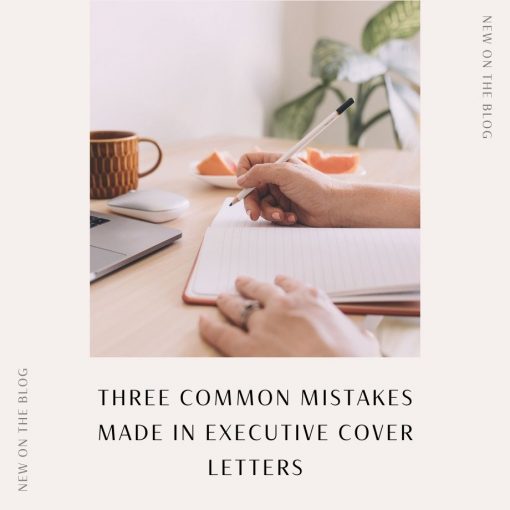
Three Common Mistakes Made in Executive Cover Letters

Your Guide to Writing Executive Cover Letters
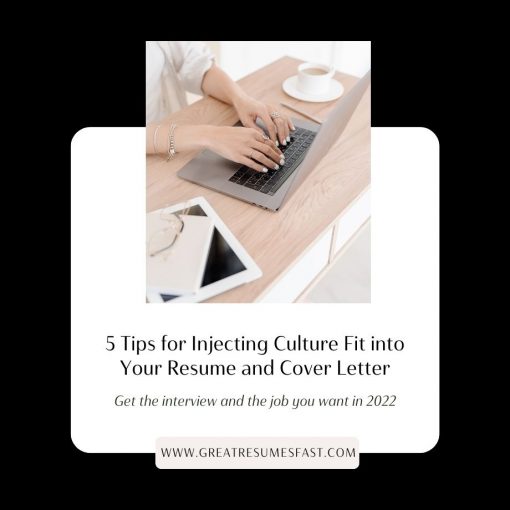
5 Tips for Injecting Culture Fit into Your Resume and Cover Letter

About the author
Jessica hernandez, president, ceo & founder of great resumes fast.
Hi, I’m Jessica. I started this company back in 2008 after more than a decade directing hiring practices at Fortune 500 companies.
What started as a side hustle (before that was even a word!) helping friends of friends with their resumes has now grown into a company that serves hundreds of happy clients a year. But the personal touch? I’ve kept that.
You might have seen me featured as a resume expert in publications like Forbes, Fast Company, and Fortune. And in 2020, I was honored to be named as a LinkedIn Top Voice of the year!
I’m so glad you’re here, and I can’t wait to help you find your next perfect-fit position!
[…] post 5-Step Guide to Writing Cover Letters for Executives appeared first on Blog | Great Resumes […]
Hi Jessia, Thanks for being a helping hand to career aspirants.Kudos to your ingenuity and benevolence. Keep writing like this! https://www.careersbooster.com/
[…] to write an effective cover letter to help you land an interview and a job, check out this article: 5-Step Guide to Writing Cover Letters for Executives. The article also includes links to cover letter samples that you might find useful when trying to […]
I have read these Guide to Writing Cover Letters for Executives. Thanks for sharing the great information about the professional resume and cover letters.
It’s a very good blog and the message will useful for someone good way of presentation and the content presentation is also good, keep blogging and give some good contents. I heard about INICIO Jobs App it has a lot of vacancies for freshers and experienced employees.
[…] ● 5 Step Guide To Writing Cover Letters For Executives ● Grab Attention With A Compelling Cover Letter ● 5 Tips For Injecting Culture Fit Into Your Resume and Cover Letter ● How To Write A Cover Letter Recruiters Will Read ● 3 Secrets To Interview-Winning Cover Letters […]
Nice article, There are good techniques that you can use just like 501 words . These are some of the practices that you can adopt while you’re in the process of writing. There are other things which can help you to increase your effectivity. But essentially, these tips are sufficient enough to develop good writing habits.
Leave a Comment
Save my name, email, and website in this browser for the next time I comment.
Improve Your Resume: Download Your Free Executive Resume Template Today
Are you struggling to create an executive resume that will impress employers? Download this free executive resume template and receive a series of 10 emails with expert guidance on how to write resume content that resonates with employers so you get more interviews.
It's everything you need to stand out, make an impression, and accelerate your job search.
Work with Us


15 Executive Director Cover Letters That Will Get Hired (NOW)
Are you are looking to write a cover letter for Executive Director jobs that will impress recruiters and get you noticed by hiring managers? You need one to apply for a job, but you don’t know what to say.
A good cover letter is essential for any job application. If you are applying to a company that requires a cover letter, then it’s likely that your cover letter will be the first thing your potential employer sees. A good cover letter can show the hiring manager what type of person you are and why you would be the best fit for their company.
Here are 15 amazing Executive Director cover letters that are professionally written and will help you stand out and get that job!

Executive Director Cover Letters
Each cover letter is written with a different focus. Review all of them and pick the ones that apply to your situation. Take inspiration from multiple samples and combine them to craft your unique cover letter.
Executive Director Sample 1
Dear Sir or Madam,
I am writing in response to the open Executive Director position at your company. I very much want to be considered for this role because of my keen interest in _____. Additionally, I have an exceptional track record that would serve me well in this position. _____. Thank you for your time and consideration.
Executive Director Sample 2
My name is _____________. I am a dedicated individual with over 10 years of experience working in the nonprofit sector, including 8 years as a CEO. I’m confident that my knowledge and skills will be an asset to your organization.
I would like to apply for the Executive Director position with you, and enclose my resume for your consideration.
Executive Director Sample 3
I am writing to express my interest in the Executive Director position. As a former military member, I have extensive managerial experience. I have led troops through combat operations and have held several other titles including first sergeant and executive officer. My leadership skills are excellent, but I also possess excellent communication skills as well as great attention to detail. Your organization sounds like a perfect match for me-thank you for your consideration!
Executive Director Sample 4
I am an Executive Director with a proven track record of success in both academic and non-profit organizations.
I have been an entrepreneur from the age of 16 when I began a lawn care company that I grew into a multimillion dollar business. I then spent time working for various non-profit organizations, including United Way and Big Brothers Big Sisters.
My past experiences have prepared me to lead your organization with integrity, compassion, and vision.
Executive Director Sample 5
To whom it may concern, I am interested in the Executive Director position with XXX. I have a 17-year track record of success in fundraising and leadership roles for non-profit organizations. I am a collaborative team player and have experience with budgets, contracts, strategic marketing plans, outreach initiatives and working with boards of directors. My time management skills are impeccable and my commitment to excellence is unmatched. I would appreciate the opportunity to interview for this position by phone or in person at your convenience.
Executive Director Sample 6
Dear Hiring Manager,
I am a highly motivated and results-driven individual who has been working in the nonprofit industry for over 8 years. I have a strong understanding of all aspects of human resources, fundraising, development and leadership. My diverse range of skills and experience will be an asset to your team. I look forward to hearing from you soon about this opportunity!
Executive Director Sample 7
I am a candidate for the Executive Director position. I have successfully directed two other nonprofit organizations to success and have been successful in raising funds from private donors as well as securing federal funding. In addition, I have experience in developing programs that will enrich the community as well as alleviate poverty. If you are looking for a multi-faceted individual who will bring enthusiasm and creativity to your organization, please contact me immediately.
Executive Director Sample 8
I am a dedicated professional with a diverse range of skills and experience. I have great leadership skills, proven ability to increase revenues and execute excellent marketing strategies that have attracted new donors and increased long-term support. I am highly accomplished in creating a strong team spirit in the organization and building partnerships in the business community for financial stability. Furthermore, my success in teaching illiterate adults to read has been recognized by many state officials as being one of the most successful literacy programs in the country. If you are looking for an innovative leader with a track record of success I would love to be considered for this opportunity.
Sincerely, _____________
Executive Director Sample 9
Dear Executive Director, This letter is in response to your posting for an Executive Director position. I am excited about the opportunity to apply my skills and experience with fundraising, event coordination, and administration to support the continued growth of this organization. As you can see from my attached resume, I have extensive experience working in non-profit organizations. My success has been primarily due to my ability to build relationships with donors while remaining dedicated to delivering quality work that meets your needs. I would be thrilled if you would consider me for this position and look forward hearing from you soon.
Executive Director Sample 10
I am writing to express my interest in the Executive Director position at . My qualifications for this role include four years of experience as the Executive Director of the Chicago Community Foundation, five years with Goldman Sachs, and seven years with Valero Energy Corporation. I have extensive experience leading teams, managing multi-million dollar budgets, and developing strategic initiatives. I am looking for a new challenge where I can use my skills to help an organization achieve its goals. Thank you for your consideration.
Executive Director Sample 11
I am John Doe. I am a highly experienced Executive Director of non-profit organizations and have more than 10 years of experience in the non-profit sector. I am presently interested in the position of Executive Director with your organization and would welcome an opportunity to discuss my qualifications and experience with you. Please contact me at (123)-456-7890 or [email protected]
Sincerely, John Doe
Executive Director Sample 12
I’m writing to express my interest in the Executive Director position at _____. I would be a strong candidate for this position, as I am passionate about making an impact on the lives of others and feel like this role is a perfect fit for me.
My qualifications include ____, ____, and ____. I look forward to meeting with you to discuss how my skills could benefit your organization (or other relevant statement). My resume is attached below.
I am submitting this professional cover letter as someone with significant experience in the nonprofit sector managing budgets, organizing events/programs, board governance and more. I’ve been called a “results-driven individual who really cares about people.” At X nonprofit
Executive Director Sample 13
Dear ____, I am an experienced director with a proven track record of successful projects in the nonprofit sector. I am confident that I can hit the ground running and start producing results right away. I have experience managing staff, budgets, marketing, program development and more. My track record speaks for itself. I look forward to speaking with you further about this opportunity. Please contact me at your earliest convenience by calling (555) 555-5555 or emailing me at [email protected] . Thank you for your consideration! Sincerely,
Executive Director Sample 14
Dear ___________,
I am writing to express my interest in the Executive Director position that was advertised on your job listing. I have 16 years of experience in nonprofit management and financial oversight, with more than 8 years of experience accrued overseeing fiscal operations.
I also have more than 6 years of professional fundraising experience and would be happy to outline my qualifications for this position upon request. Thank you for your consideration.
Executive Director Sample 15
Dear Mr. Teller, I am interested in applying for the position of Executive Director to be based out of [city], [state]. I have been a member of the [organization] community for over 20 years and have served as a volunteer, Board Member, and Vice President. I bring a wealth of experience that includes: -Responsibility for raising funds and supervising all financial affairs -Board Development and Conflict Management -Leadership Development and Training -Program Management (i.e., annual conference)
Recruiters and hiring managers receive hundreds of applications for each job opening.
Use the above professionally written Executive Director cover letter samples to learn how to write a cover letter that will catch their attention and customize it for your specific situation.
Related Careers:
- 15 Customer Service Representative Cover Letters That Will Get Hired (NOW)
- 15 Nanny Cover Letters That Will Get Hired (NOW)
- 15 QA Tester Cover Letters That Will Get Hired (NOW)
- 15 Postal Worker Cover Letters That Will Get Hired (NOW)
- 15 Medical Receptionist Cover Letters That Will Get Hired (NOW)
- 15 Cleaner Cover Letters That Will Get Hired (NOW)
- 15 Data Entry Clerk Cover Letters That Will Get Hired (NOW)
- 15 School Secretary Cover Letters That Will Get Hired (NOW)
- 15 Fashion Stylist Cover Letters That Will Get Hired (NOW)
- 15 Babysitter Cover Letters That Will Get Hired (NOW)
Leave a Comment Cancel reply
You must be logged in to post a comment.

IMAGES
VIDEO
COMMENTS
Download our free executive cover letter examples and follow our writing tips to create an impressive application that lands you a leadership position at a reputable company. ... Professional CV templates for senior-level positions. Graduate. Templates for academics and scholars. Research. A format to showcase your research background. Writer.
973-555-0117 I [email protected] I New York, New York 10001 May 20, 2023 MarketSmashers, Inc. Dear Hiring Manager, With proven success in executive leadership, I'm writing to express my interest in the position of Chief Executive Officer for MarketSmashers, Inc. My expertise in increasing revenue and innovating in global markets is the ...
Here's how to write an executive job cover letter: 1. Use the proper executive cover letter format. Stick to one-inch margins on all sides. Go with single or 1.15 line spacing. Pick a classic font and make it 11pt or 12pt. Read more: The Best Cover Letter Format. 2. Create a professional cover letter header.
A great executive care cover letter has five main elements: 1. Heading. Use a professional template to enhance the style and presentation of your cover letter. Be sure your heading includes: Your name, title, and contact info. The current date. The addressee's details. 2.
Finance Cover Letter. Financial Analyst Cover Letter. Marketing Coordinator Cover Letter. Marketing Manager Cover Letter. McKinsey Cover Letter. Office Manager Cover Letter. Or see all our cover letter examples: Best Cover Letters for All Jobs. For starters, take a look at these two executive cover letter examples. 1.
Executive Cover Letter examples Write the best Cover Letters in 5 minutes 300+ samples and expert guides used by millions of users. ... Whatever the situation, your application will need to be near-perfect to have a chance at your executive level dream job. When applying for an executive role, you'll be up against dozens of highly-qualified ...
Executive Cover Letter Example Paragraph (Chief Information Officer) "Having successfully implemented multiple comprehensive business solutions as the lead technical consultant at Futuristic Inc., I am confident that I have the skills and experience that your company can count on for further business development.". 3.
4. Showcase your leadership abilities in three lines or less. Using language such as "oversaw," "directed," "executed," "delivered," and "owned" will make your cover letter stronger. Including two to three sentences about your abilities to lead others, lead departments, or lead a company will showcase you as a strong executive.
Professional Executive cover letter samples from real job applications. Including a writing template that you can use for your Executive cover letter. ... When seeking a job as an Entry-Level Executive Manager, it's imperative to focus on leadership and project management experiences. Mention any leadership roles, even in volunteer situations ...
You can follow these steps to write your own: 1. Use a business letter format. A business letter format is professional and often used for formal communications to and from businesses. It can help draw attention to your cover letter and its contents. To write a cover letter using this format, you can use 2.5cm margins and left-align your text ...
Pick your best skills, credentials and any notable accomplishments from your experience in executive or other leadership positions to include in your letter. 2. Create an outline. An outline can help you draft a more organized and professional cover letter. Consider using an online template to maximize the professional look of your letter.
Two of our resume packages (Career Evolution and Executive Priority) include cover letter writing. We guarantee you'll get 2x more job interviews within 60 days or we'll rewrite your resume for free. The better the cover letter, the more likely the interview. Use our executive cover letter writing service today!
1. Format your letter professionally. Before you begin writing a cover letter for an executive position, ensure that you format your letter professionally. This means using one-inch margins at each side of the page, having single or 1.5 line spacing and choosing an 11-12pt sized font.
Here are some steps that you can follow to write a cover letter for an executive role: 1. Gather information. Before you write your cover letter, gather as much information as you can about the company you plan to apply to. Including details in your letter that show you understand the position and the business can make your letter more ...
Here's a short cover letter example to get you started: Dear Mr. Smith, Over the course of my [X] years of experience, I have always found that I have a natural talent for management. When I was a low-level worker, I typically took leadership roles when available.
For an executive manager cover letter, emphasis on leadership and organization, strategic planning, excellence in communication, project management, and teamwork can set you apart from the crowd. ... Agencies like Korn Ferry, Heidrick & Struggles, and Spencer Stuart specifically deal with management and executive-level positions. They have ...
Executive Director Cover Letter Overview. Example 1: Cover Letter for Non-Profit Sector. Example 2: Cover Letter for a Corporate Company. Example 3: Cover Letter for a Start-up. Writing Tips for Executive Director Cover Letter. Sample Sentences and Phrases. Common Mistakes to Avoid. The purpose of this article is to provide you with handy ...
Read this free executive cover letter sample to see how to write a unique and compelling cover letter. Dear Ms. Rothman, As a well-qualified executive with over 23 years of industry expertise, I would be an excellent fit for the position with Nelson Enterprises. My stellar track record of increasing product offerings, profitability, and market ...
This cover letter example is strong because it employs general cover letter writing best practice. It is neatly and clearly formatted, the contact details are correct and easily referenced, and it is within the prescribed one page limit. For senior level or executive role cover letters, the details or specifics of your accomplishments are ...
Free Senior Executive cover letter example. Dear Mr. Nelson: With this letter and the enclosed resume, I would like to express my strong interest in the Senior Executive position you are looking to fill. As an experienced and successful business leader with more than 22 years of experience driving superior operations and overall corporate ...
4. Make sure your cover letter is different from your resume. 5. Use anecdotes and examples. 6. Explain why you are a good fit for the job position. A good cover letter can help you gain the attention of future-potential employers or recruiters, to your job application or resume. At the executive level, you are constantly competing with other ...
As I've already mentioned, an executive cover letter needs to communicate your professional personality and why you are a good fit for the position. If you do this, and do it well, your resume is far more likely to get the attention it deserves and get you an interview. Action verbs and high-impact phrases are equally important in your resume ...
Executive Director Sample 3. Dear Sir or Madam, I am writing to express my interest in the Executive Director position. As a former military member, I have extensive managerial experience. I have led troops through combat operations and have held several other titles including first sergeant and executive officer.